Natural Sciences
72nd Graduation Ceremony: CoNAS presents 268 graduands with a record 17 PhDs
Published
4 years agoon
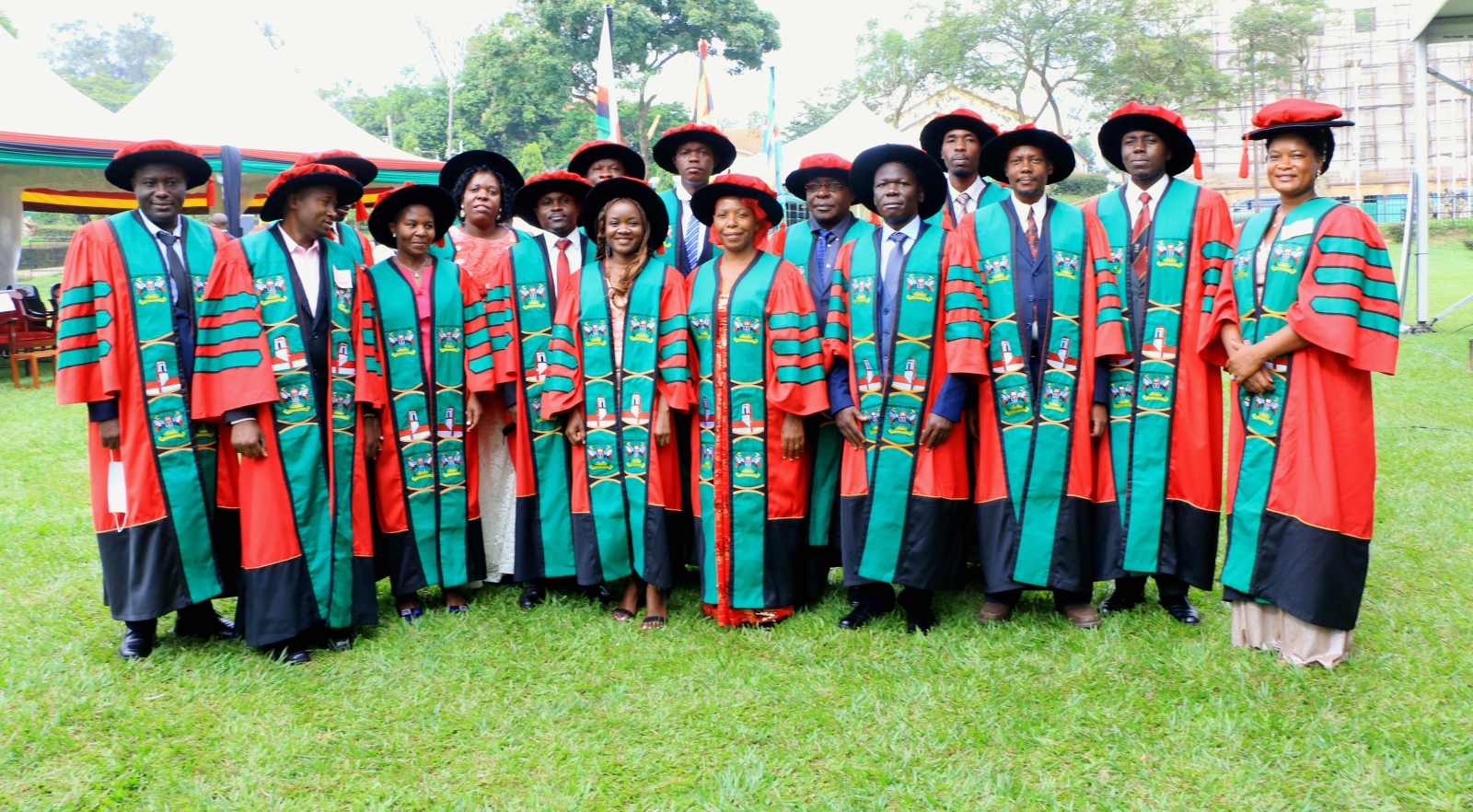
The 72nd graduation ceremony of Makerere University has kicked off today, 23rd May 2022 with the Colleges of Natural Sciences (CoNAS) and Health Sciences as well as the School of Law presenting students for the award of degrees and diplomas in various disciplines.
The graduation ceremony presided over by the Chancellor, Prof. Ezra Suruma was graced by the President of the Republic of Uganda, H.E. Yoweri Kaguta Tibuhaburwa Museveni and the First Lady, also Minister of Education and Sports, Hon. Janet Kataaha Museveni.
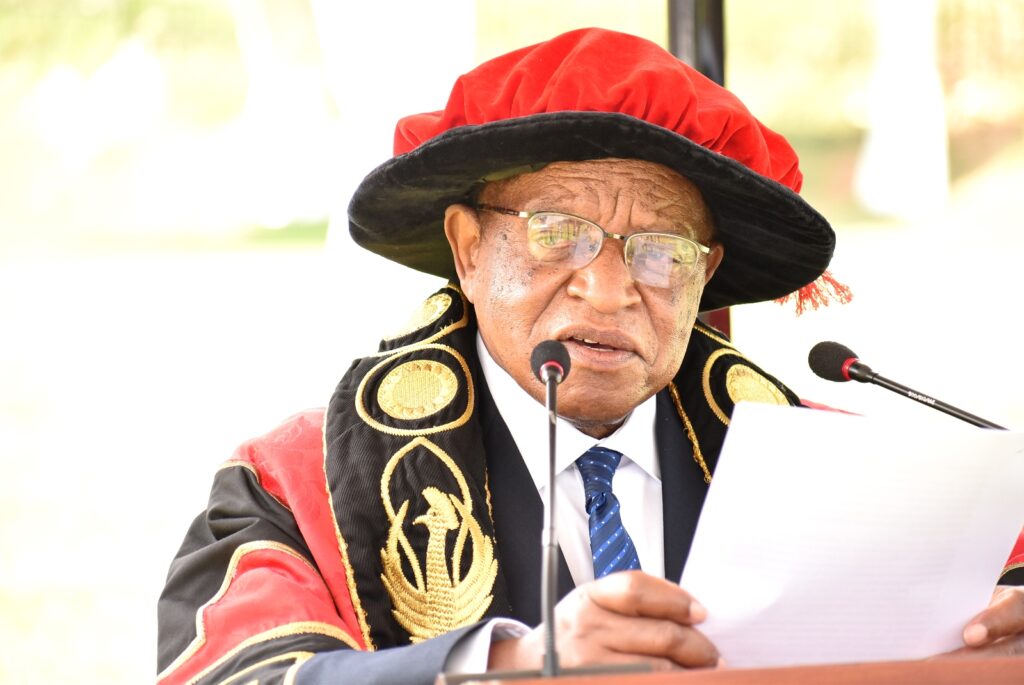
During 72nd graduation ceremony that ends on Friday, 27th May 2022, a total of 12,474 graduands will receive degrees and diplomas of Makerere University. Of these, 100 will graduate with PhDs, 1,236 with Masters degrees, 10,998 with Bachelor’s degrees and 140 with undergraduate and postgraduate diplomas. 52 % of the graduands are female and 48 % are male. Forty of the 100 PhD graduands and 492 of the 1,236 Masters graduands are female, representing 40% in each category.
The College of Natural Sciences has presented a total of 268 students including 17 PhDs, 22 Masters (4 female,18 male) and 229 undergraduates (72 female, 157 male). Of these, a total of 5 students (1 female, 4 male) graduated with First Class degrees. Eight students attained PhD in Mathematics, the highest number of PhD graduates from a single department in the 100-year history of Makerere University. The students were sponsored by the SIDA Bilateral Programme, 2015-2022, project 316 ‘Capacity Building in Mathematics and its Applications. Since 2015, the Project led by Prof. John Mango has sponsored 21 PhD students.
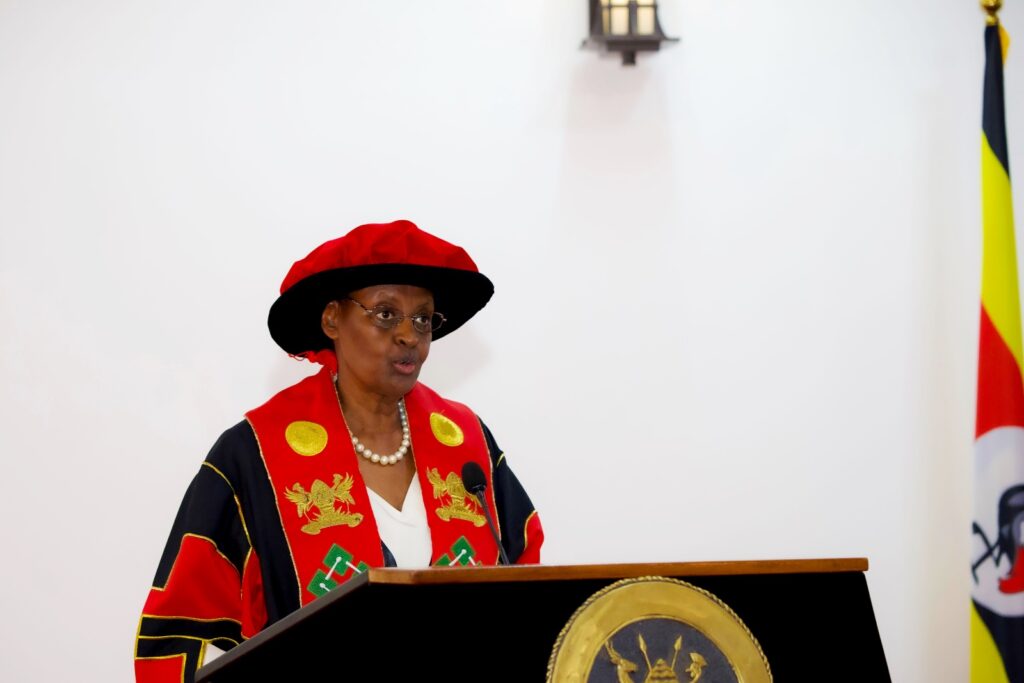
Presenting the graduands, the Principal of CoNAS, Prof. Winston Tumps Ireeta commended Prof. Mango for his invaluable contribution towards research and training in the Department of Mathematics.
The 17 PhD graduates include; Adaku Christopher, Anywar Godwin, Buttibwa Mary, Eneku John Paul, Inuwa Badamasi, Kito Luliro Silas, Kyomuhangi Annet, Mayanja Edison, Mukisa Ambrose, Ochen William, Opio Peter, Nabawanda Olivia, Nanfuka Mary, Nalule Rebecca, Okello Joseph Omwonylee, and Wamono Felix.
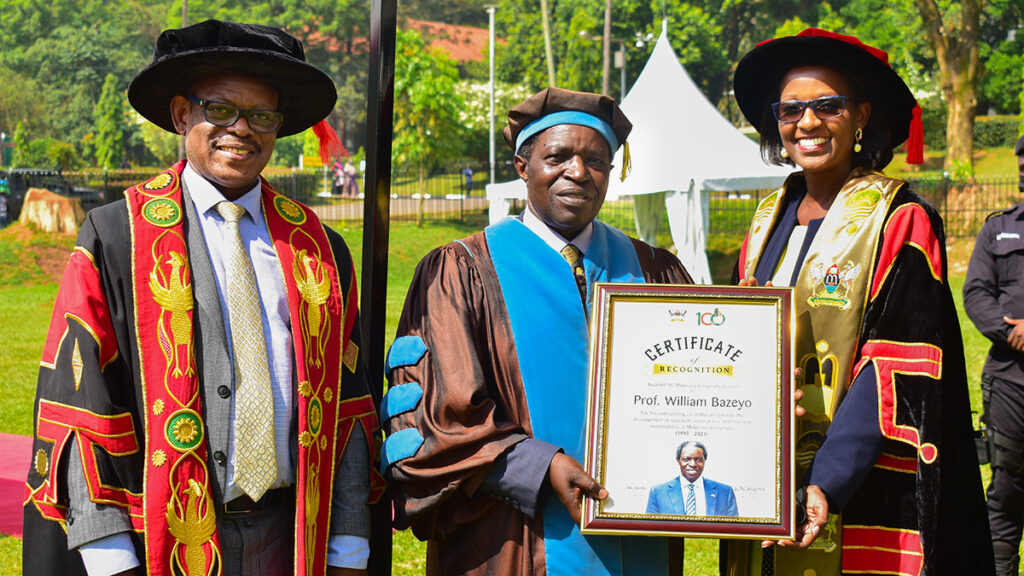
Remarks by the President
Speaking at the ceremony, the President of the Republic of Uganda, H.E. Yoweri Kaguta Tibuhaburwa Museveni who attended virtually re-echoed the importance of science in development. “The trigger of social change is science. I appeal to Ugandans and social scientists to understand this. When Africa was colonized, it was not that we lacked Kings, Magicians, Priests, we lacked science. Science was not emphasized. What was emphasized was these other actors. We want to emphasize science because it is the basis of socioeconomic transformation,” he explained, recommitting to facilitate government scientists better. “We have insisted on giving good salaries to Government scientists including science teachers in public Universities and secondary schools. This is not because we have forgotten the social scientists and arts people. This is because we cannot handle all at a go,” he noted. Additionally, the President emphasized the need for collaborative research. Commenting on security on Campus, he pledged to facilitate the completion of the University Perimeter wall.
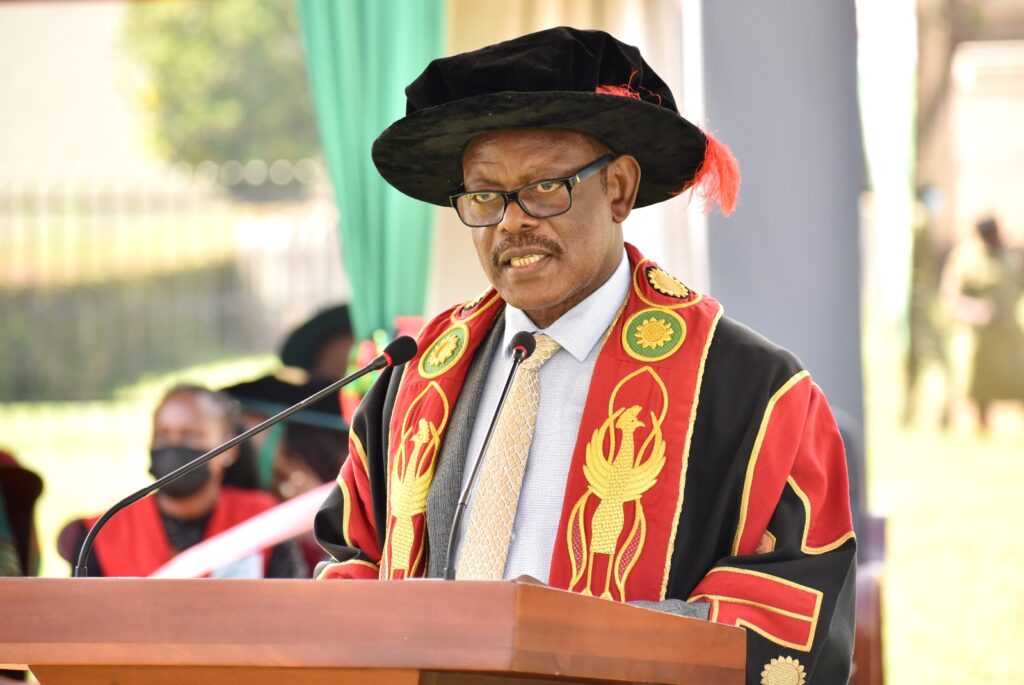
Remarks by the Minister of Education and Sports
Delivering her remarks, the First Lady, also Minister of Education and Sports, Hon. Janet Kataaha Museveni who also attended virtually congratulated the graduands and their parents for the success registered. She thanked the University Management for their commitment in ensuring students attain quality education. “Together with our partners in development, we are still struggling to improve the working conditions, revamp the university infrastructure and to have new curriculum. We are grateful to our partners who have stood with us but most of all the government. We are specifically grateful to the NRM government because it shepherds the Ugandan child from childhood by providing basic health and education services. Government hope is that the Parish Model will empower the family to support the other education requirements of children. As we celebrate 100 years, we thank God for where He has brought us from. From 14 students, the University now has over 3,8000 students. This is no mean achievement. We must stand together. Let nothing divide us in our pursuit to transform the University and country. We should learn to embrace dialogue in conflict resolution,” she noted. The First Lady appreciated the Government for the enormous investment in research at the University. “Through government processes, we received funding for the construction of a 300-bed teaching hospital. This will greatly improve the teaching infrastructure at the University.”
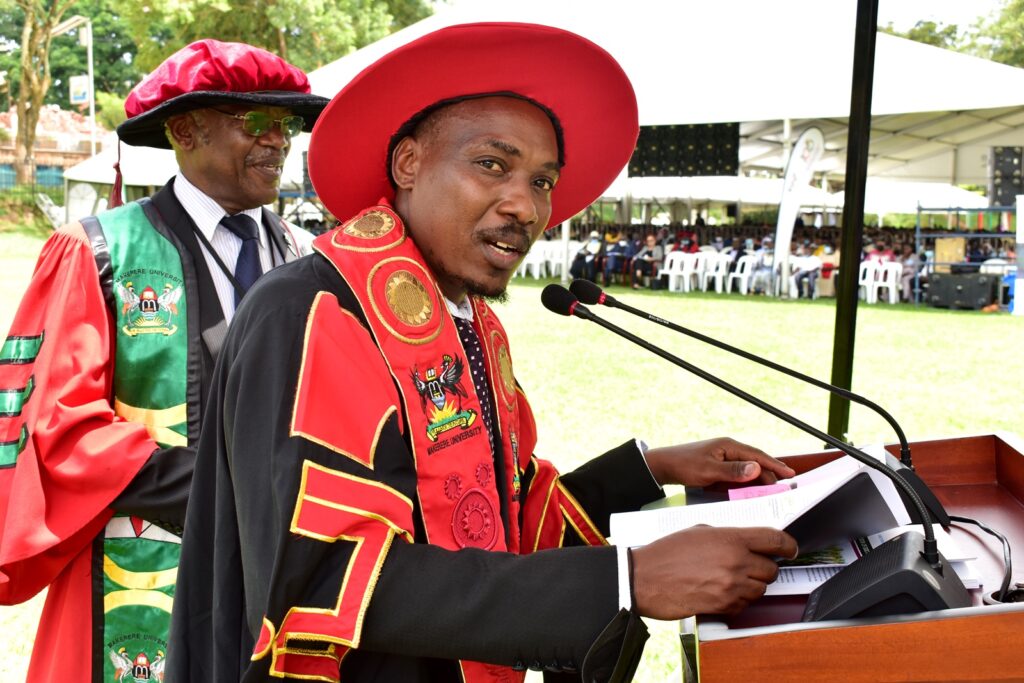
The Chairperson, Makerere University Council
Addressing graduands, the Chairperson, Makerere University Council, Mrs. Lorna Magara appreciated the Vice Chancellor for the great service rendered to the University for the years he has held the Office. She presented an award to Prof. William Bazeyo, for his exemplary service as Deputy Vice Chancellor, Finance and Administration. During his tenure, Prof. Bazeyo played a tremendous role in soliciting for funding for the University, leading to a reduction of the University debt from UGX120 billion in 2017 to less than UGX 10 billion currently.
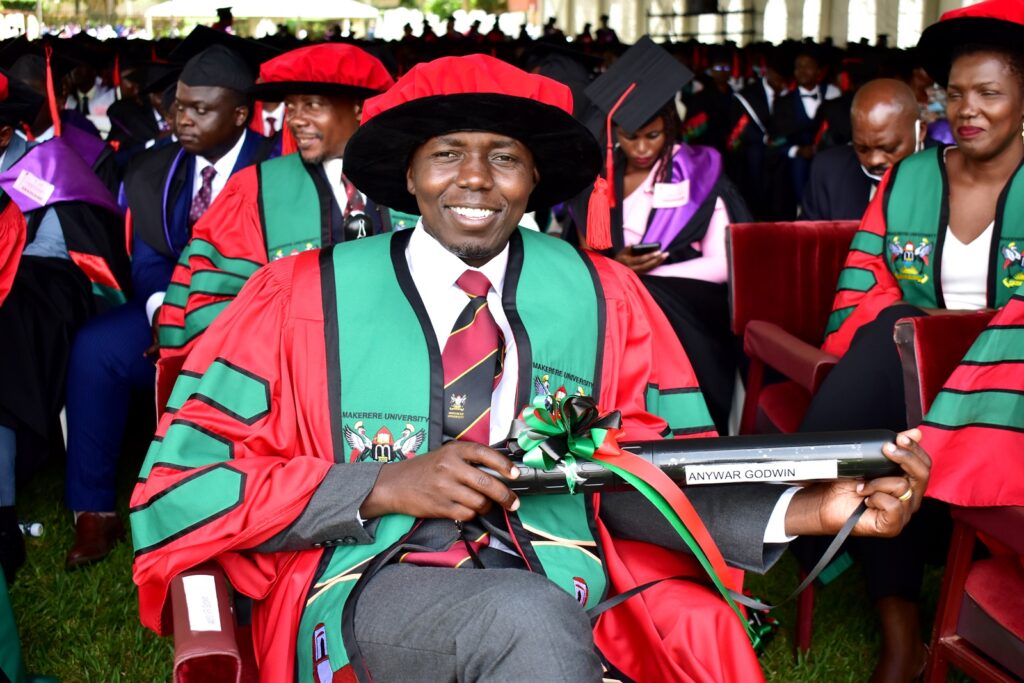
Remarks by the Chancellor
The Chancellor, Prof. Ezra Suruma appreciated the President and the First Lady, for their exceptional leadership and persistent determination in managing the Covid19 pandemic. “Despite the enormous economic, social and political pressures that you faced, you refused to relent in the face of the havoc of covid19 upon the world in general and Uganda in particular. I believe that your firm stand on vaccination and on preventive lockdown helped to save thousands of lives of Ugandans who would probably have died.” The Chancellor also appreciated the Government of Uganda for the commitment towards advancing research and higher education in the Country.
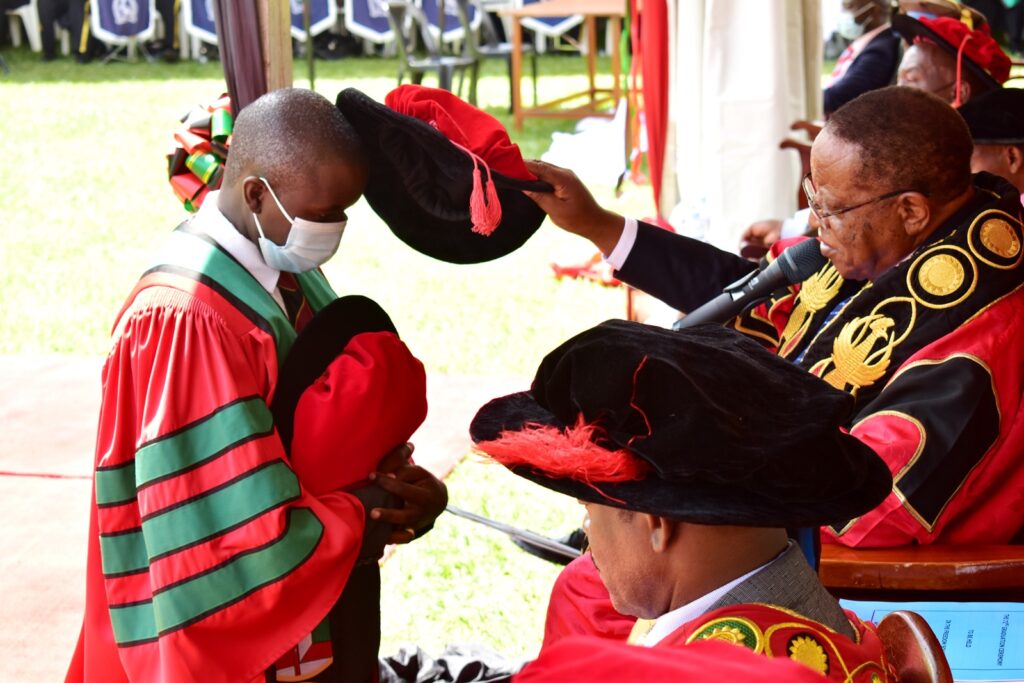
In his address, the Chancellor congratulated the graduands and paid tribute to the parents and guardians for the sacrifices made to ensure their children attain quality education. “I plead with the graduands to never forget to cherish and to honour your parents, guardians and sponsors who have sacrificed so much to help you reach this graduation day. As they become older, they will increasingly need your love and financial support. Whenever I meet someone I assisted and he or she tells me how they cherished my support I feel greatly uplifted. But whenever I remember someone I assisted but who has never bothered to send even a message of greetings, I feel discouraged. Please endeavor to cultivate an attitude of gratitude,” he advised.
The Chancellor appreciated Makerere University Management and faculty for the commitment and time invested in delivering quality education to the students.
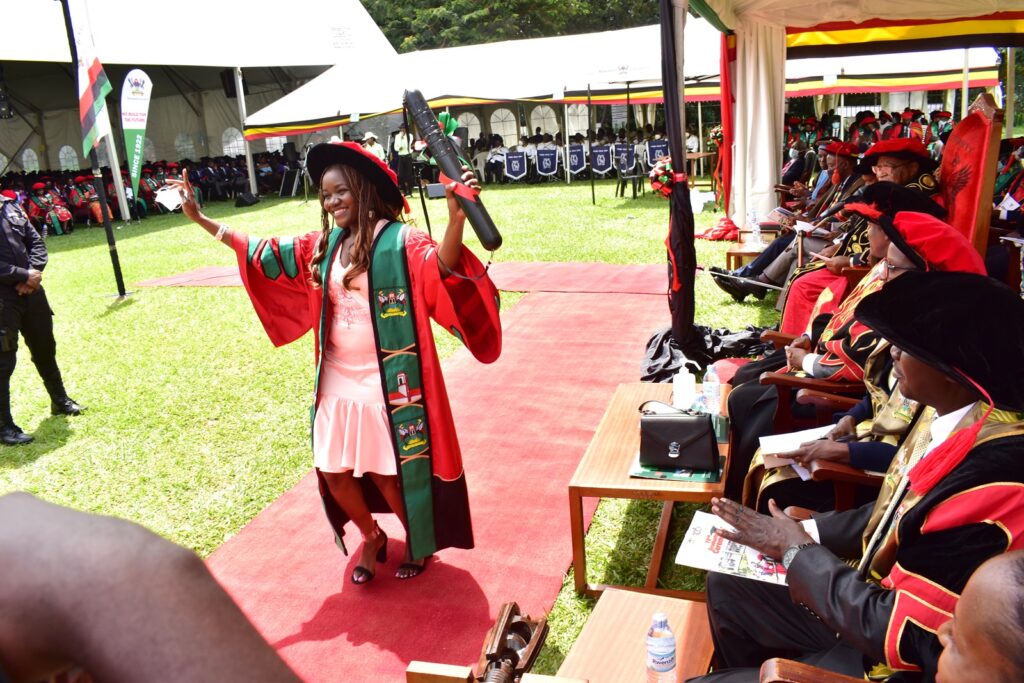
The Vice Chancellor’s address
The Vice Chancellor congratulated the students and professors on the achievement. He thanked the parents, guardians, Government, and other sponsors, for supporting the students. “A total of 254 of this week’s graduands have been supported under the Government of Uganda Students’ Loans Scheme under the Higher Education Students’ Financing Board (HESFB). Since 2014, the Students’ Loan Scheme has supported 1,816 Students to study different Science Programmes at Makerere University, making it the single biggest supporter of private students at the Institution. These students would otherwise never have achieved their higher education dreams if it was not for the Students’ Loan Scheme. I wish to congratulate you the beneficiaries and appeal to you to use the skills and knowledge you have acquired to serve your country but also remember to pay back such that more students can be supported.”
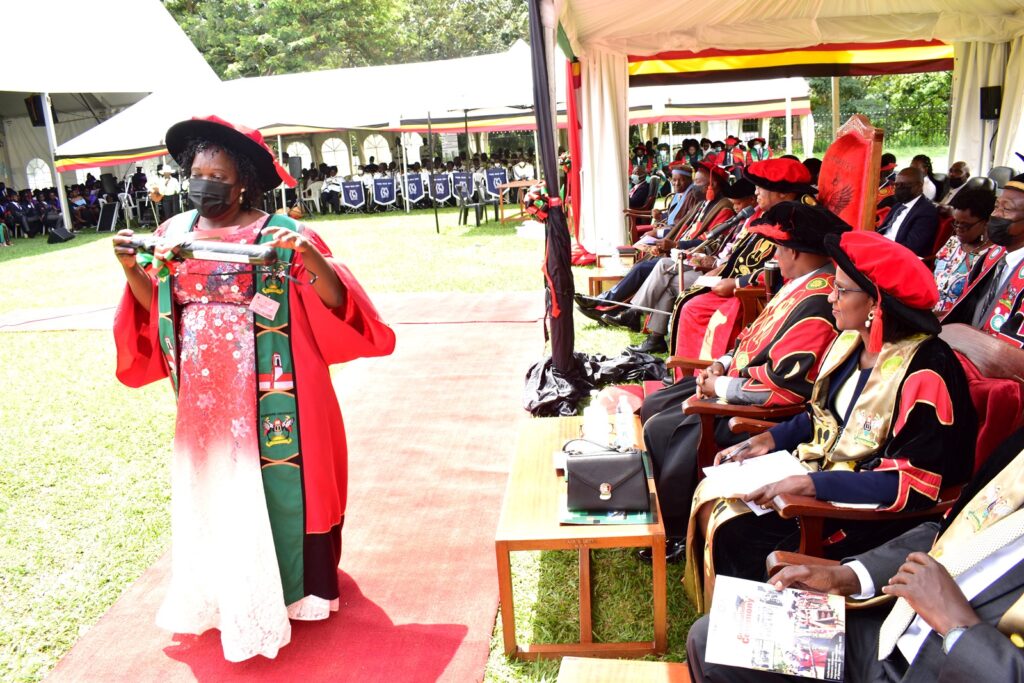
Similarly, the Vice Chancellor appreciated all development partners who have supported many students to attain quality education at Makerere, including the Mastercard Foundation, Sida, Norad, The Madhvani Foundation, the Inter-University Council of East Africa, as well as Government Ministries and Agencies.
The Vice Chancellor thanked the University Council for expanding the Female Scholarship Scheme to support 40 girls from disadvantaged backgrounds, with special attention to Uganda’s ethnic minorities, including the Ik, the Dodoth, the Batwa, and the Jie. “It is also my pleasure to report that the University Council policy on affirmative action for girls in STEM is already bearing fruit. Because of that policy, the enrolment of girls in STEM has increased from 35% to 42% over the last two academic years.”
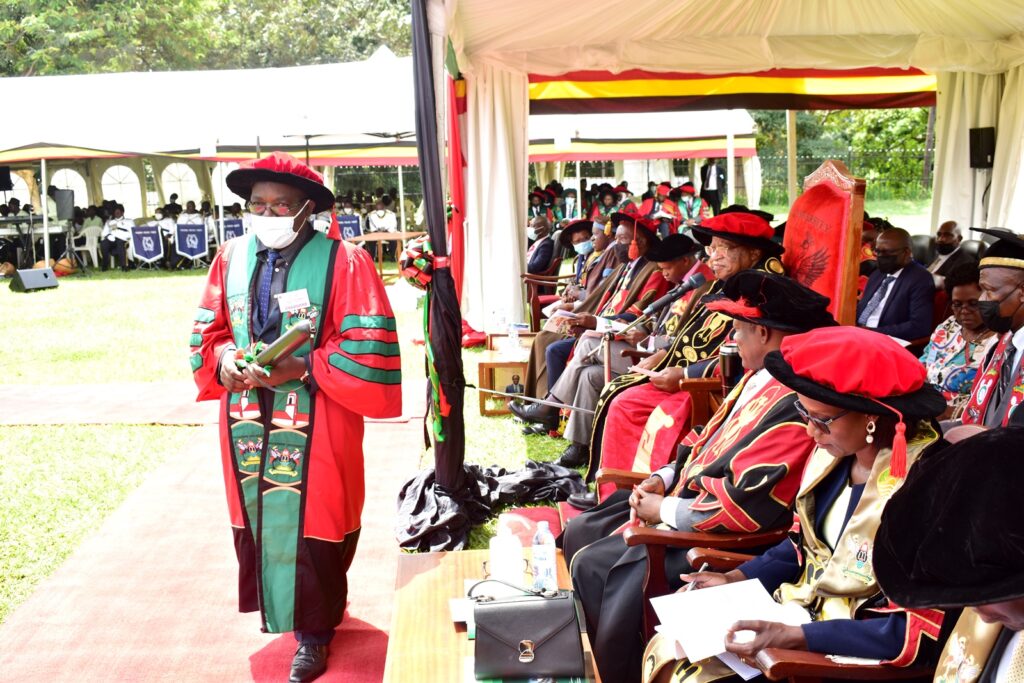
Regarding research and innovation at Makerere, the Vice Chancellor appreciated the Government for the allocation of UGX 30 billion annually for the last three years towards the Research and Innovation Fund, commonly referred to as RIF. “This fund has transformed Makerere tremendously. Out of 1,200 applications received, more than 700 research grants have so far been allocated and more than 500 innovations have been recorded, many of them with potential for commercialization, and a number of policy briefs and manuals have been developed. The Government of Uganda is now the single largest funder of research at Makerere University and we are obliged to respond by increasing our efforts to find solutions to our Country’s development challenges. Our potential for innovation came out during the COVID-19 pandemic when more than 200 innovations to fight that disease were realized. I congratulate the Makerere researchers for their patriotism and zeal.”
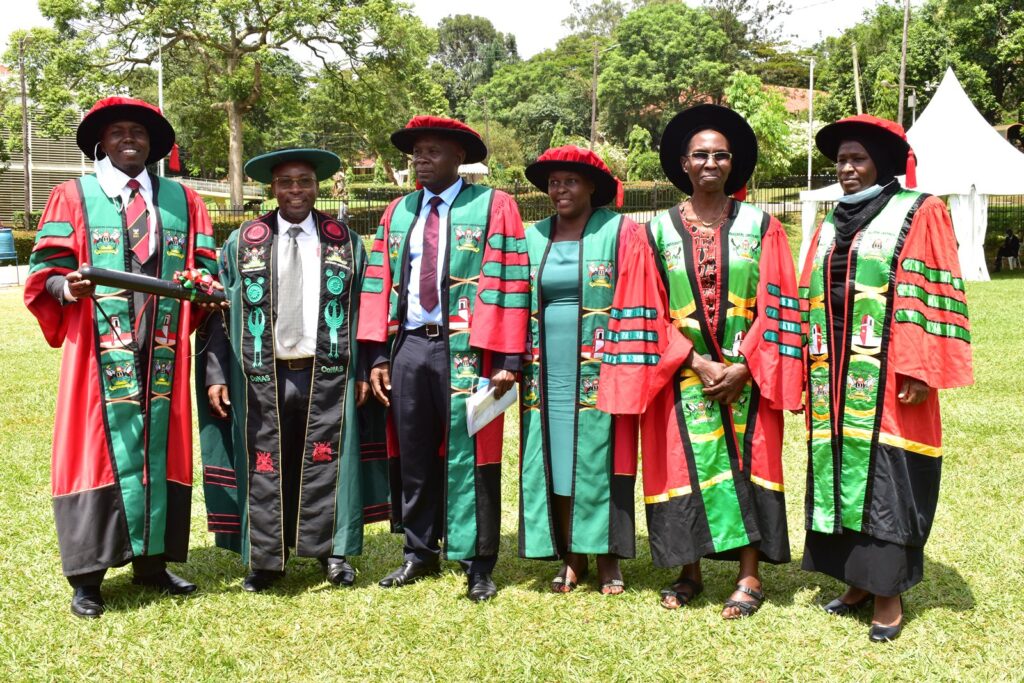
He also appreciated the Government for the considerable investments in improving Makerere University infrastructure. “Last week the First Lady and Minister of Education and Sports came to Makerere to commission some buildings and lay foundation stones for others, including the reconstruction of our iconic Main Administration Building, for which Government has already availed all the UGX 21 billion required. The new building for the School of Dentistry has enabled us to equip the biggest dental hospital in East Africa. The Central Teaching Facilities have greatly alleviated the shortage of teaching and office space, and the new building for the School of Law will enhance research and graduate training in the discipline of Law. All these projects will cost the Government more than UGX 60 billion and we thank you very much indeed.”
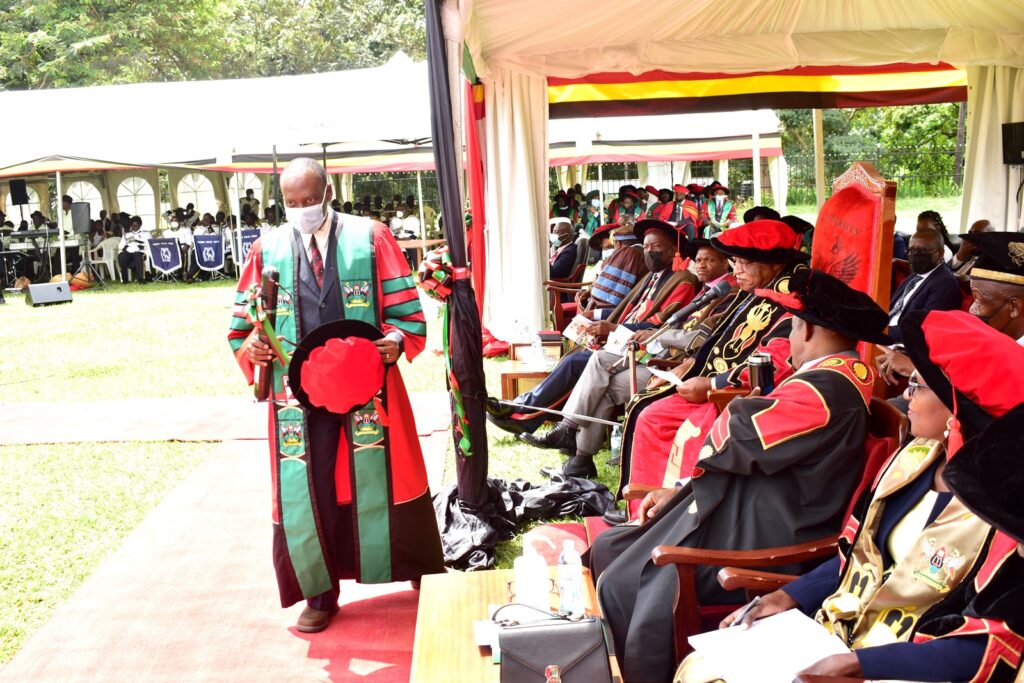
The Vice Chancellor equally thanked the President for the pledge to support the construction of a perimeter wall around the University campus. He also appreciated the President for his directive for the allocation of funds to renovate student halls of residence and facilities of the College of Health Sciences. “These facilities are central to student welfare and the quality of our teaching and training. With these investments, I want to assure Your Excellency that we shall give our best to build the human capital of this country and enhance research and innovation to drive the national development agenda. The grant of USD 300 million negotiated by the First Lady and Minister of Education for the construction of a teaching hospital at Makerere University will greatly revolutionise teaching and research at Makerere. Makerere will never be the same again,” he noted. He also extended gratitude to the government for the pledge of UGX 800 million to support activities to mark 100 years of Makerere University. This year, Makerere is celebrating 100 years of excellent service to humanity. The climax will be on 8th October 2022.
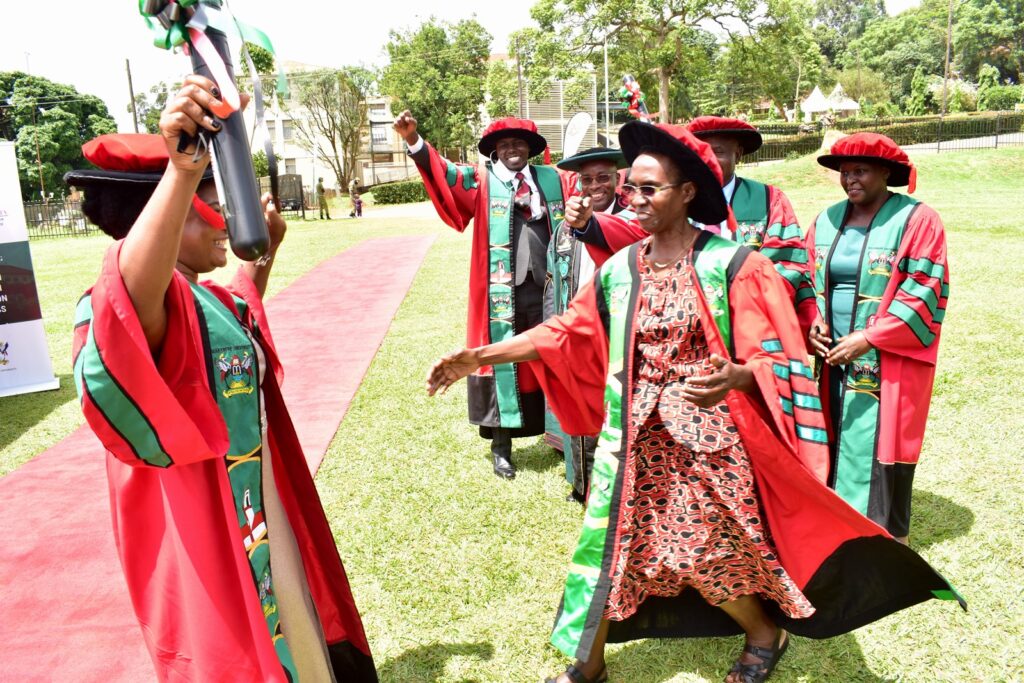
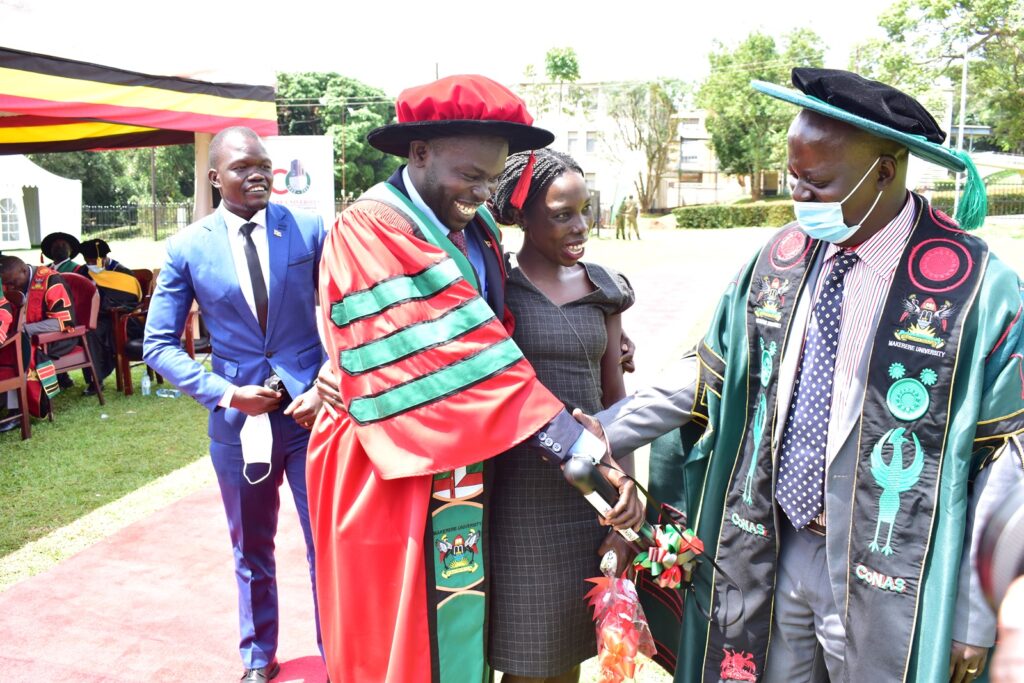
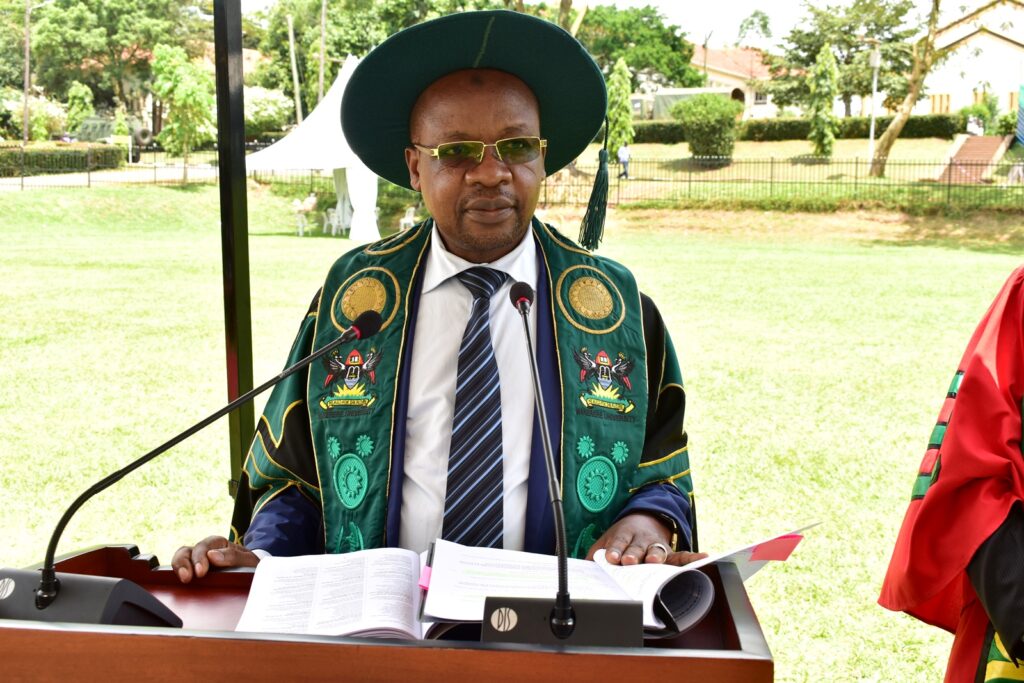
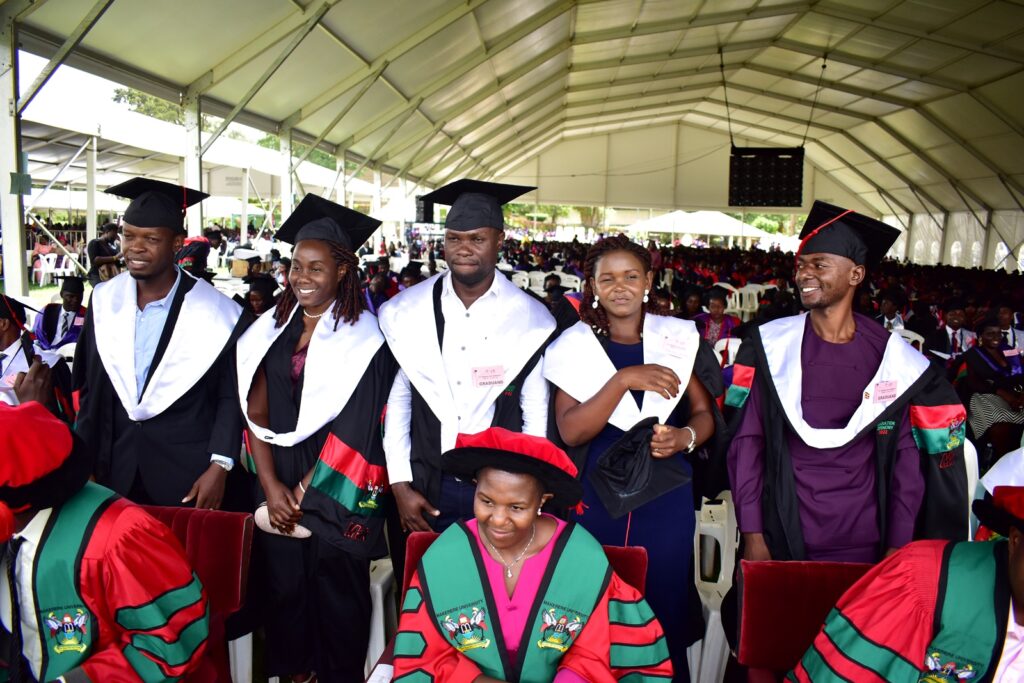
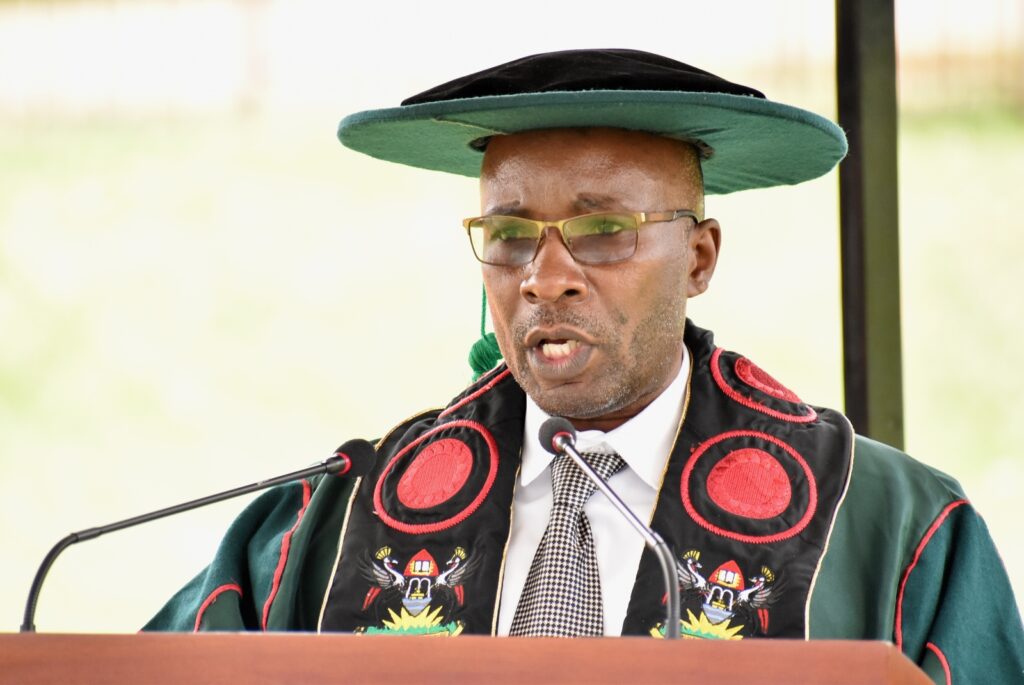
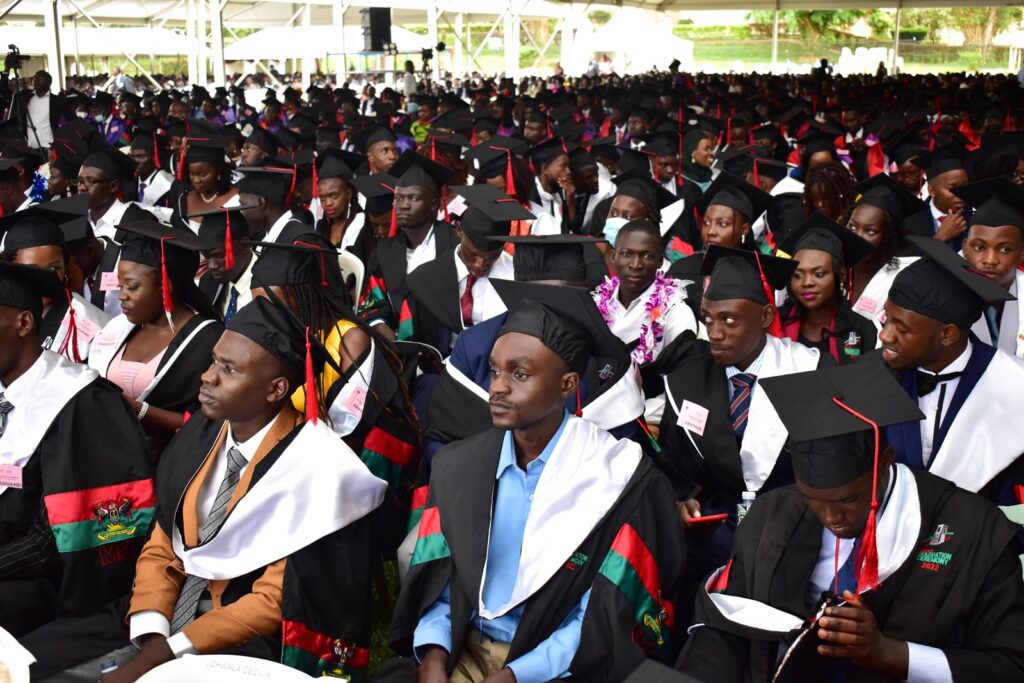
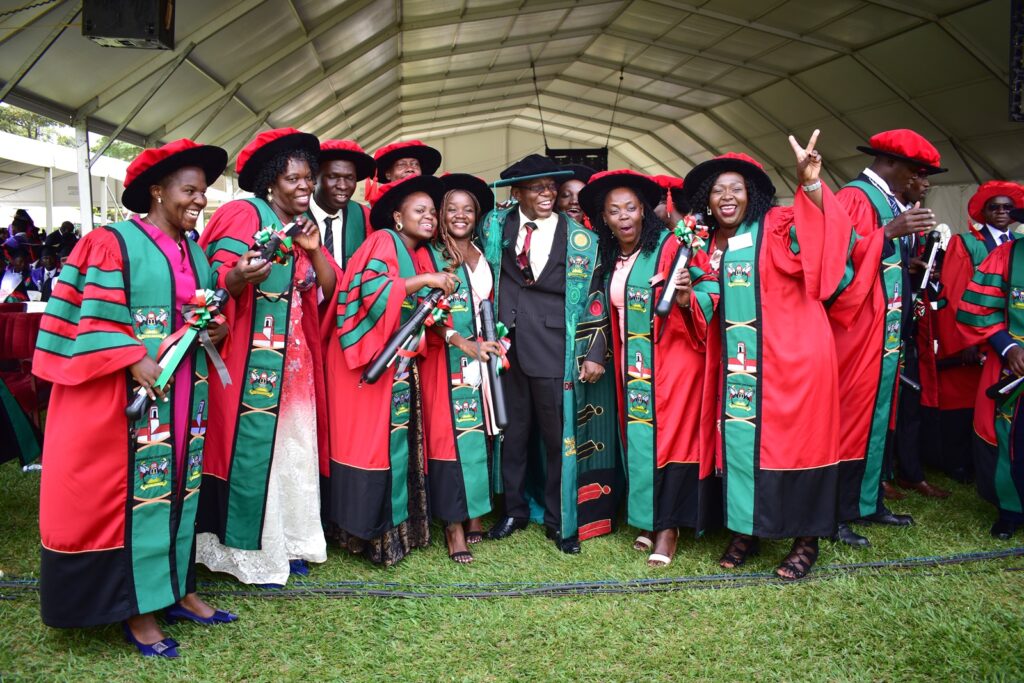
Full speech by the Minister of Education and Sports, Hon. Janet Kataha Museveni at: https://www.youtube.com/watch?
You may like
-


Over 9,200 to graduate at Makerere University’s 76th Graduation
-


76th Graduation Highlights
-


Meet Najjuka Whitney, The Girl Who Missed Law and Found Her Voice
-


Makerere University School of Public Health Graduates First Cohort of Cost-Effectiveness Analysis Short Course
-


Climate variability found to shape malaria trends in Yumbe District
-


Mak hosts First African Symposium on Natural Capital Accounting and Climate-Sensitive Macroeconomic Modelling
Natural Sciences
BOKU University Charts New Collaboration Strategies with Mak’s Department of Zoology, Entomology & Fisheries Sciences
Published
2 weeks agoon
February 12, 2026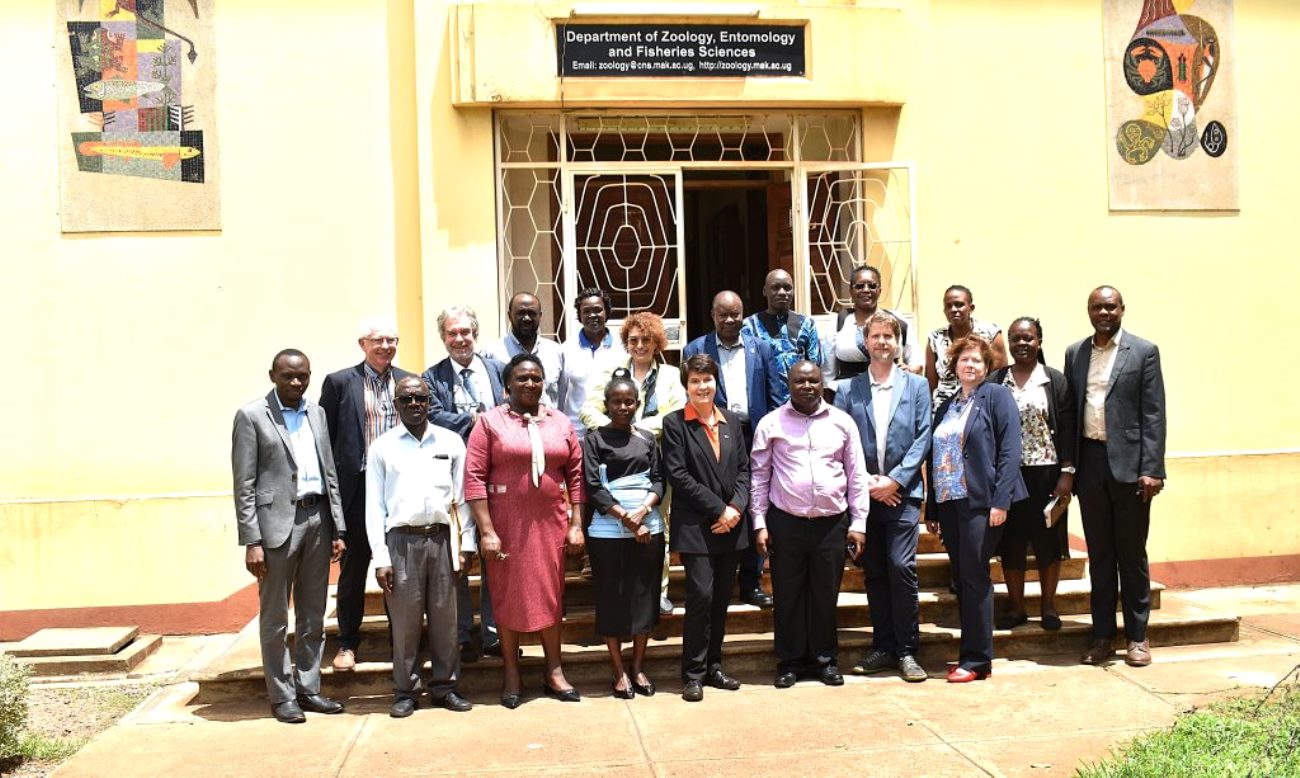
The Department of Zoology, Entomology and Fisheries Sciences at Makerere University on 11th February 2026 hosted a high-level delegation from the University of Natural Resources and Life Sciences, Vienna (BOKU), to discuss strategies for future collaboration in a partnership that has spanned five decades.
The meeting followed the BOKU team’s participation in the opening ceremony of the Promotion of Hybrid Renewable Energy Systems towards Electricity Access in Uganda project, an initiative designed to expand access to decentralized renewable energy solutions. The project, implemented under CEDAT, is funded by the Austrian Partnership Programme in Higher Education and Research for Development (APPEAR), a programme of the Austrian Development Cooperation administered by OeAD.
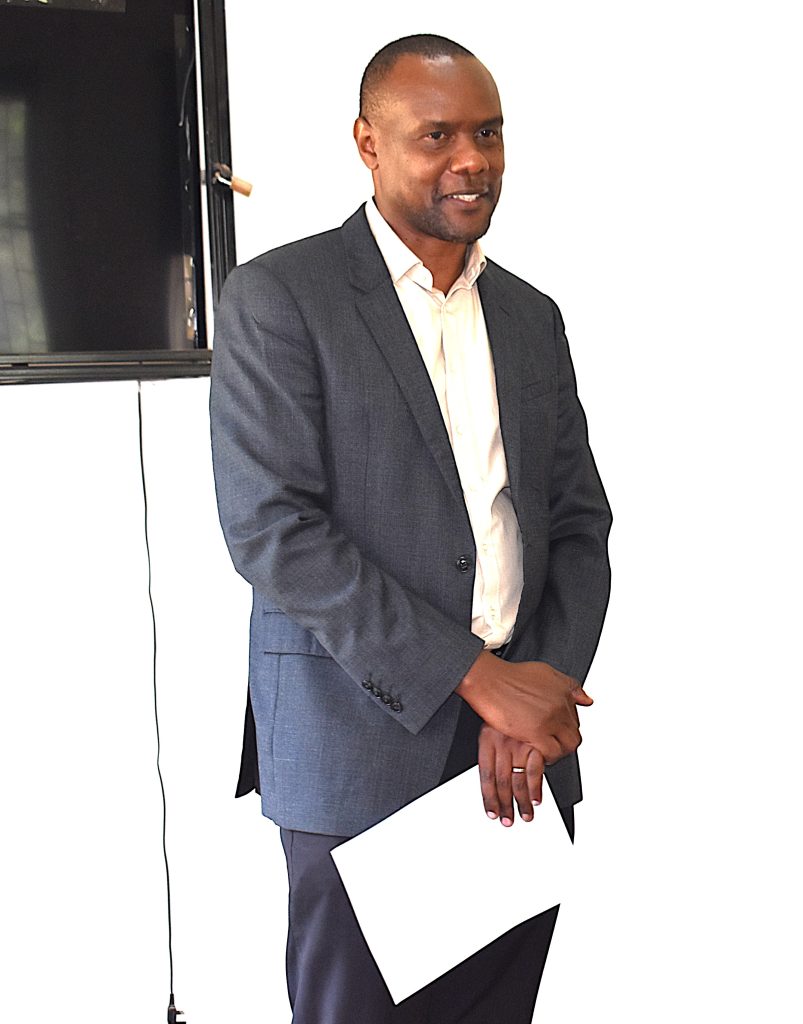
Discussions at the Department of Zoology, Entomology and Fisheries Sciences focused on deepening and broadening a historic collaboration that has shaped aquatic sciences, fisheries research, and environmental management in East Africa for half a century.
A Partnership Rooted in Limnology
The collaboration between Makerere University and BOKU traces its origins to 1975 with the establishment of the International Post-Graduate Course in Limnology (IPGL) by the late Heinz Löffler (1927-2006). The eight-month UNESCO-supported course, hosted in Lunz, Mondsee and Vienna, was designed to train scientists from developing countries in limnology – the study of inland waters.
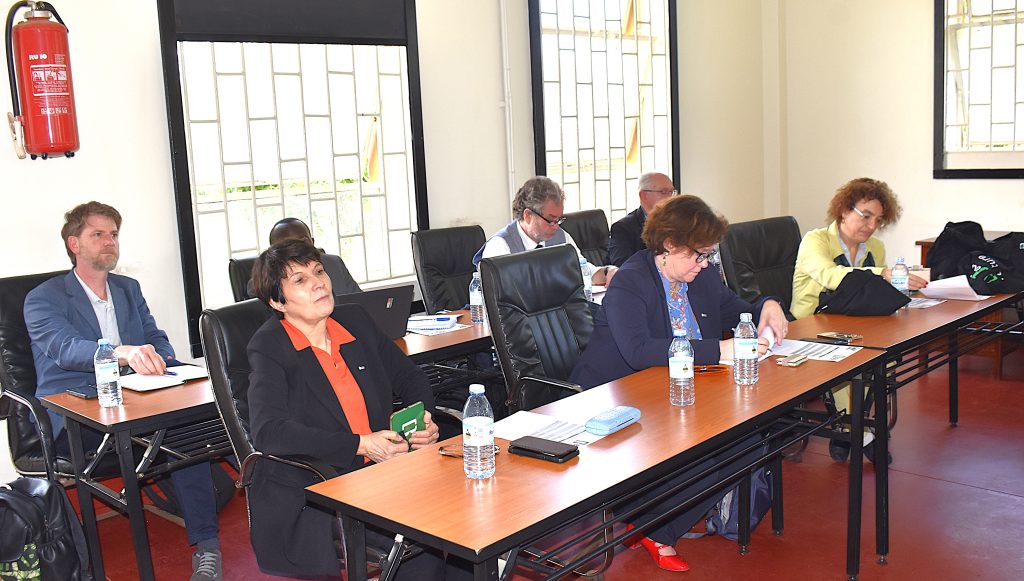
In 1976, Dr. Gwahaba James Joshua of Makerere’s Department of Zoology, Entomology and Fisheries Sciences became the first beneficiary from the university. Two years later, Boniface Makanga attended the UNESCO course and went on to initiate a Marine Practical Course to the Indian Ocean in 1993. That programme has since grown into over 30 years of annual field activity in Mombasa, benefiting undergraduate and master’s students and strengthening hands-on marine science training at Makerere.
Over time, IPGL evolved into a vibrant International Joint Degree Master’s Programme in Limnology and Wetland Management. The programme has built capacity for 123 aquatic professionals – 56 female and 67 male, including 20 from Makerere University. Notably, 11 dedicated limnologists are currently based within the Department of Zoology, Entomology and Fisheries Sciences, a testament to sustained capacity development.
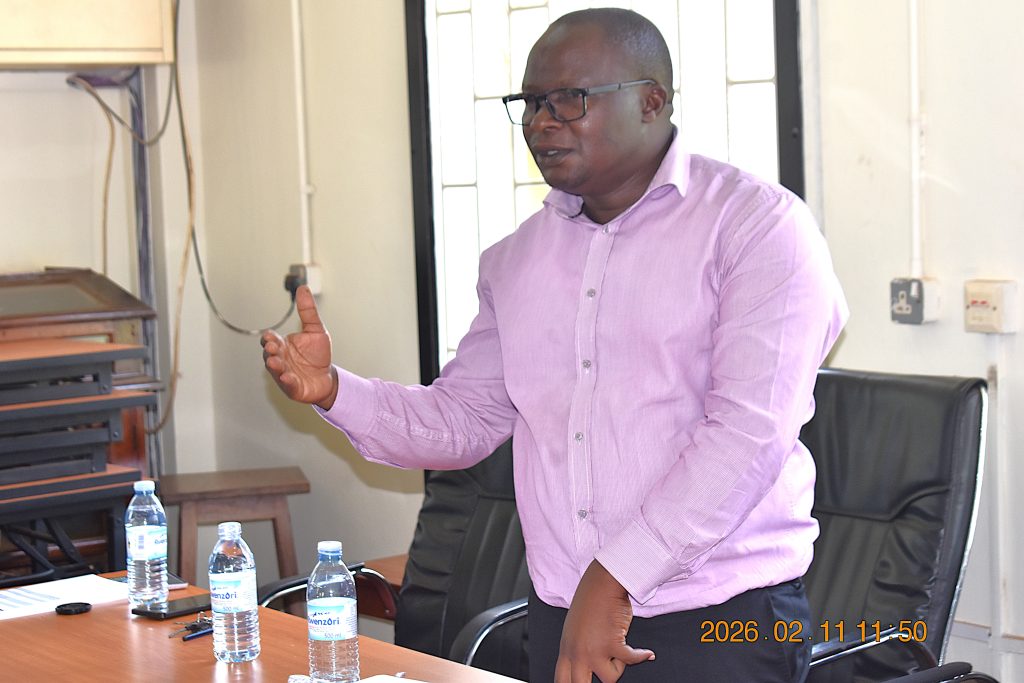
Expanding into Fisheries, Aquaculture and Regional Networks
The Mak-BOKU collaboration progressively expanded beyond limnology into fisheries, aquaculture, and broader freshwater ecosystem management.
Among the key initiatives was STRECAFISH (2015-2018), which focused on strengthening regional capacity in fisheries and aquaculture research and training to improve food security and livelihoods in Eastern Africa. The programme adopted a modular approach, trained 28 MSc students, supported five full PhDs and 11 MSc research projects, and facilitated 14 staff exchanges.
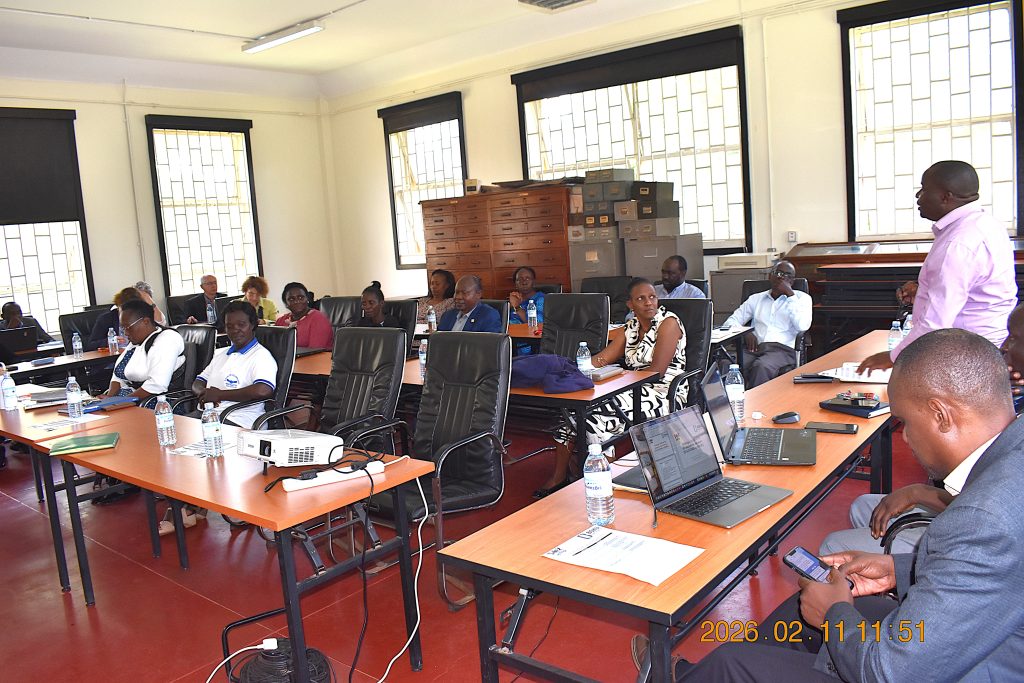
This momentum continued under COTRA (Collaborative Training in Fisheries and Aquaculture in East, Central and Southern Africa) from 2017 to 2023. COTRA enhanced staff and student mobility, supporting 24 master’s students (six credit-seeking and 18 degree-seeking), 12 doctoral candidates (four credit-seeking and eight degree-seeking), and 10 faculty and administrative staff. The initiative emphasized fit-for-purpose PhD training in aquaculture and fisheries to address food security challenges in Sub-Saharan Africa under the ACP-EU Cooperation Programme in Higher Education (EDULINK II), in partnership with institutions such as Lilongwe University of Agriculture and Natural Resources.
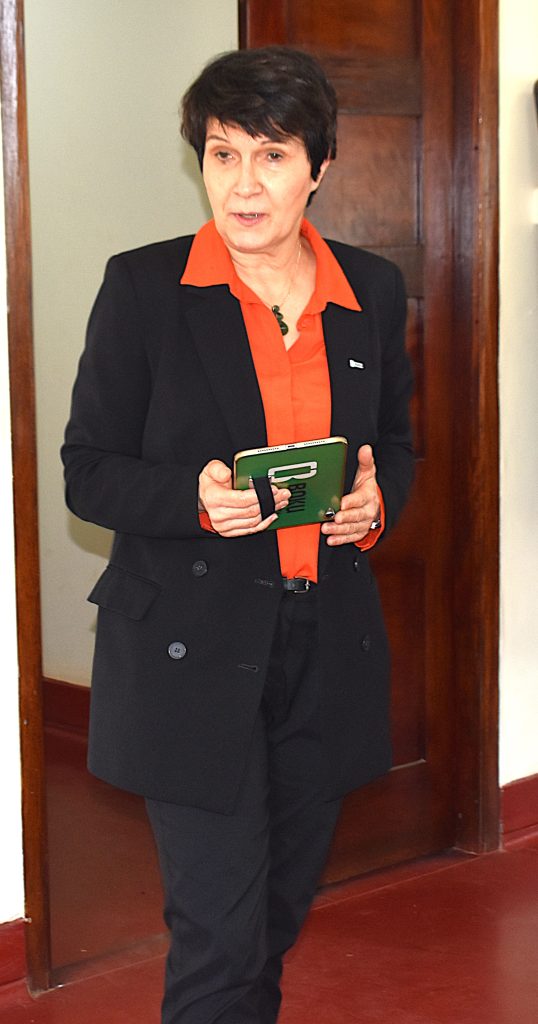
Ongoing collaborations include the Erasmus+ KA1 Learning Mobility of Individuals programme (2021-2027), which connects BOKU and Makerere with Egerton University, Kyambogo University, Addis Ababa University, Bahir Dar University and others. Additional joint initiatives include:
FreshNet: A higher education and research network for sustainable management of freshwater ecosystems in Eastern Africa, involving BOKU, Egerton University, Addis Ababa University, Bahir Dar University, EIAR and IHE Delft.
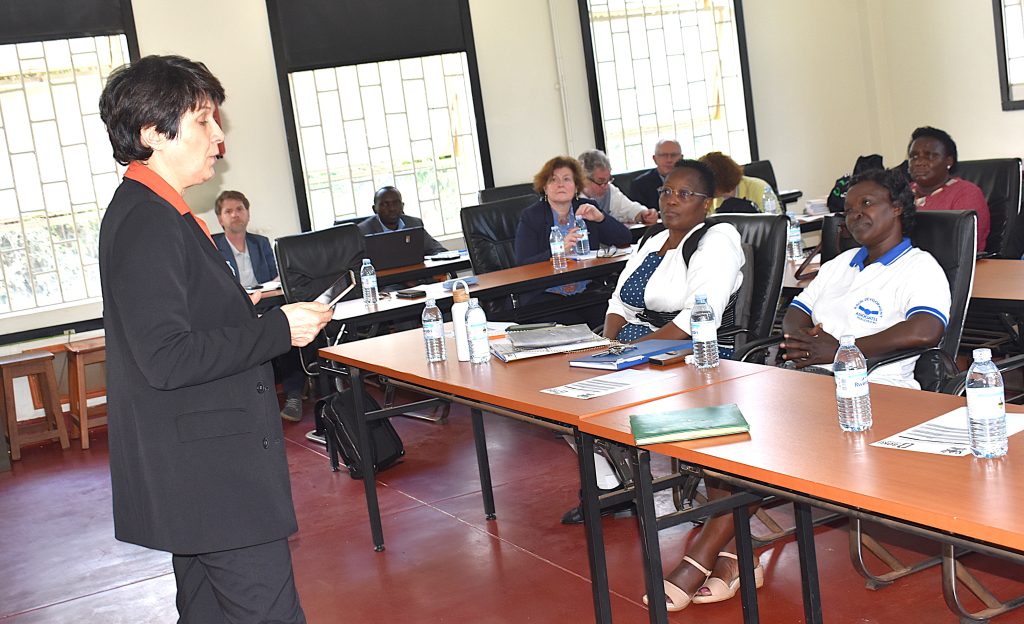
SWAQ-Uganda (2021-2026): Sustainable water quality management supporting Uganda’s development ambitions, implemented with IIASA, BOKU and Uganda’s Ministry of Water and Environment.
BIOGOLD (2024–2027): A project on biosorption for sustainable small-scale gold mining in Uganda, involving Kyambogo University, Makerere University, Gulu University, the University for Continuing Education and the University of Pretoria.
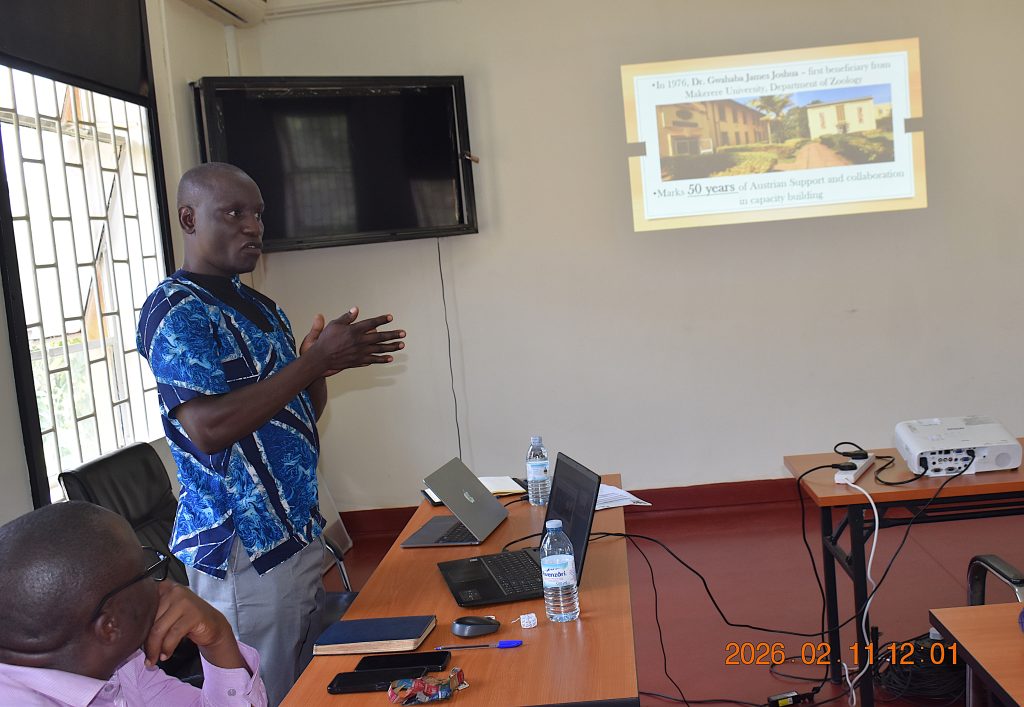
Collectively, these initiatives underscore a 50-year-old partnership that has built critical human resources at MSc and PhD levels in aquatic ecosystem management, conservation and utilization. The collaboration has also facilitated acquisition of essential research equipment, strengthened administrative capacity in project management, and nurtured a culture of knowledge sharing and innovation.
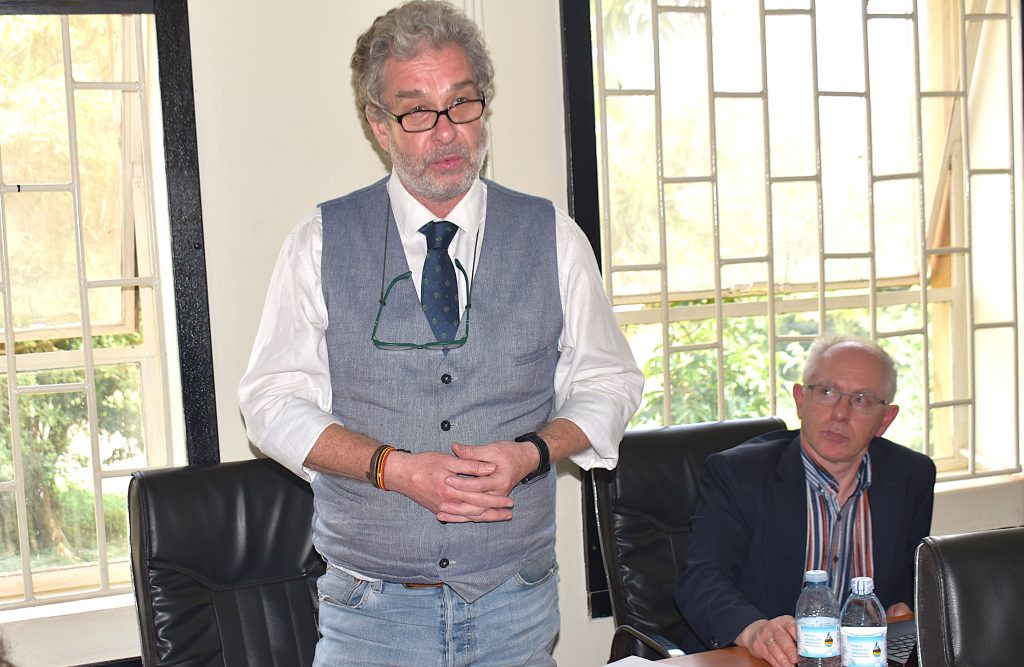
Meeting with the BOKU delegation
The BOKU delegation was led by the Rector, Prof. Eva Schulev-Steindl, a specialist in environmental law, and Vice Rector Assoc. Prof. Doris Damyanovic, an expert in landscape planning. They were accompanied by:
- Mag. Gerold Winkler, Coordinator of the Applied Limnology / Limnology and Wetland Master’s programme;
- Dr. Mathew Herrnegger, BOKU’s Africa Cooperation Country Coordinator and hydrology specialist; and
- Dr. Andreas Melcher, Africa-Uninet Coordinator from BOKU’s Institute for Development Research.
During the discussions with departmental staff, Dr. Akoll presented a detailed account of the partnership’s evolution and achievements, emphasizing its transformative impact on regional training and research capacity.
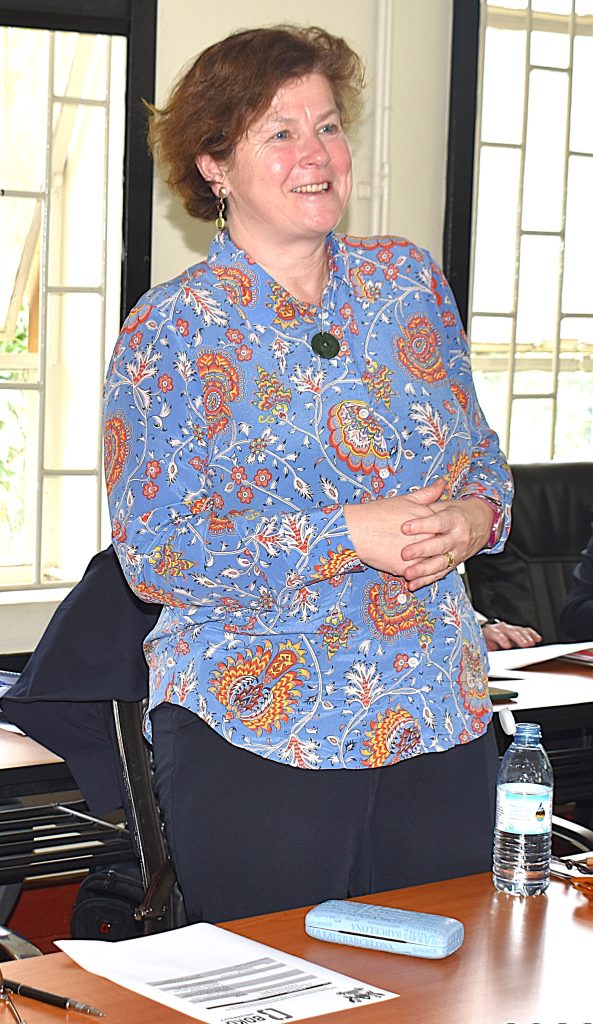
Charting the Next Chapter
As the partnership enters its sixth decade, both institutions are keen to expand into new frontiers. Key areas identified for future collaboration include:
- Enhanced staff and student exchanges;
- Joint research projects and co-publications;
- Introduction of short courses at the Makerere University Biological Field Station, Kibale beyond wildlife studies;
- Research on climate change and its effects on marine and freshwater resources;
- Advancement of basic biological research; and
- Strengthening fisheries research and innovation.
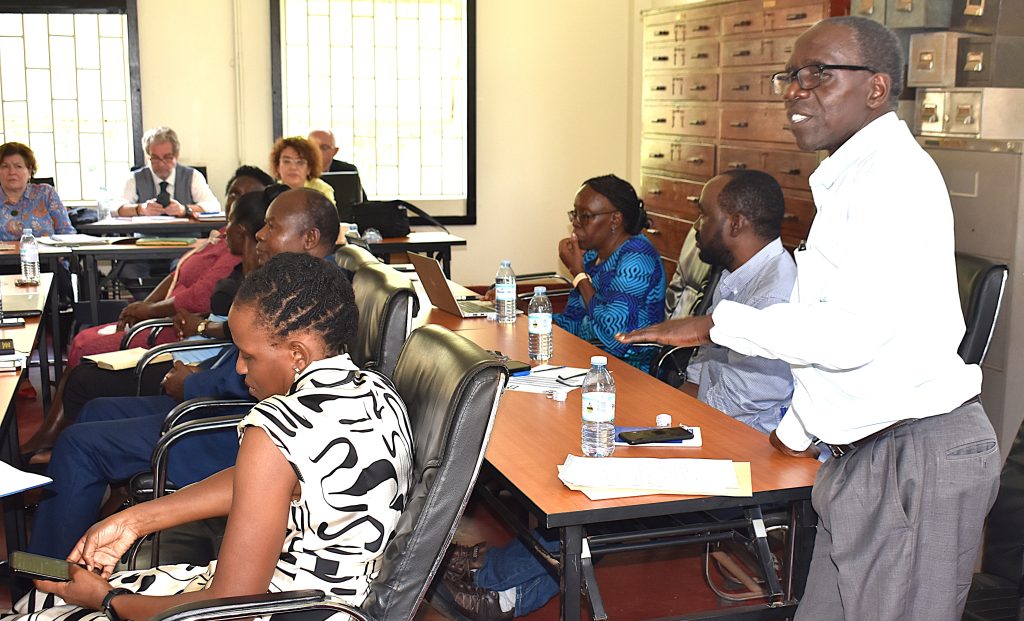
In his remarks, the Head of the Department of Zoology, Entomology and Fisheries Sciences, Dr. Godfrey Kawooya expressed gratitude for the enduring partnership, noting that it has significantly strengthened regional training capacity and supported the education of numerous Makerere staff and students. He added that the collaboration reinforces Makerere’s standing as one of the most collaborative universities globally and aligns closely with its research agenda.
Rector Schulev-Steindl reaffirmed BOKU’s commitment to advancing the longstanding relationship, describing it as a model of North-South academic cooperation built on mutual respect, shared knowledge and tangible impact.
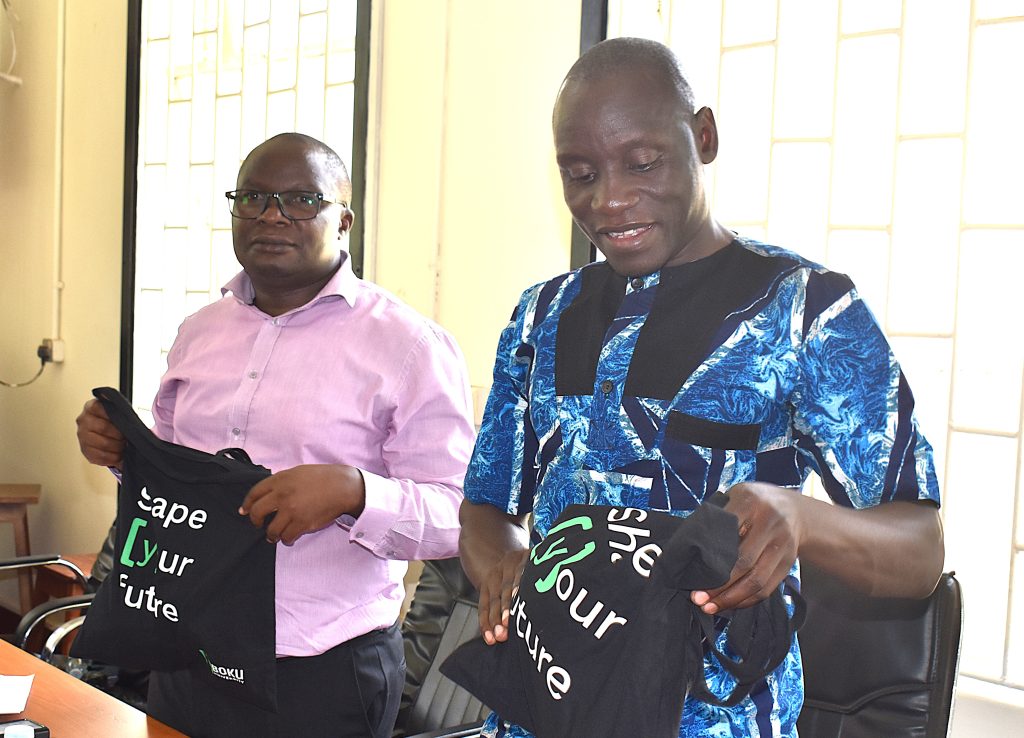
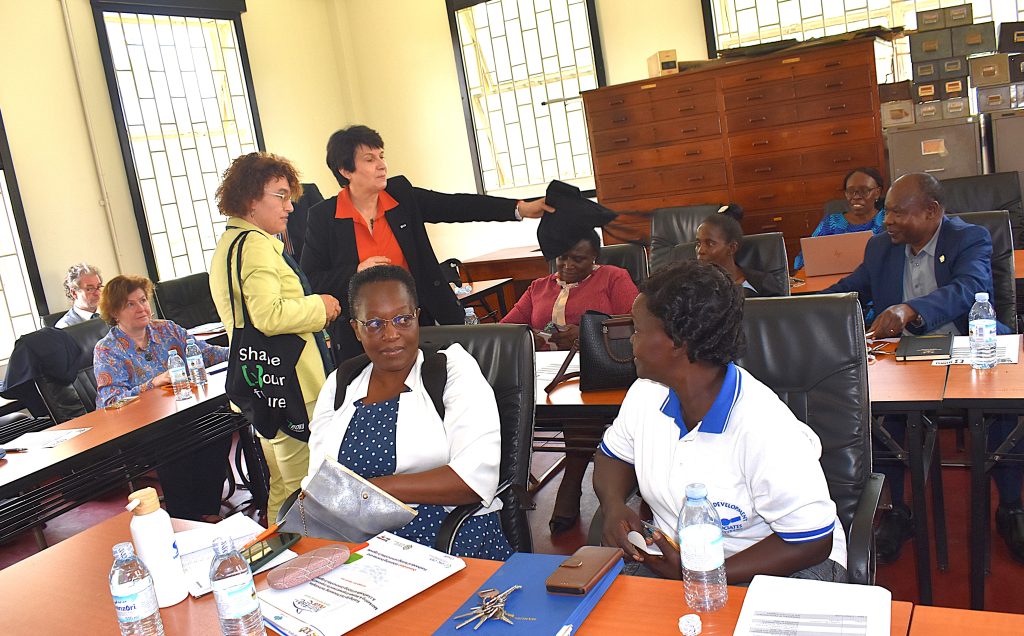
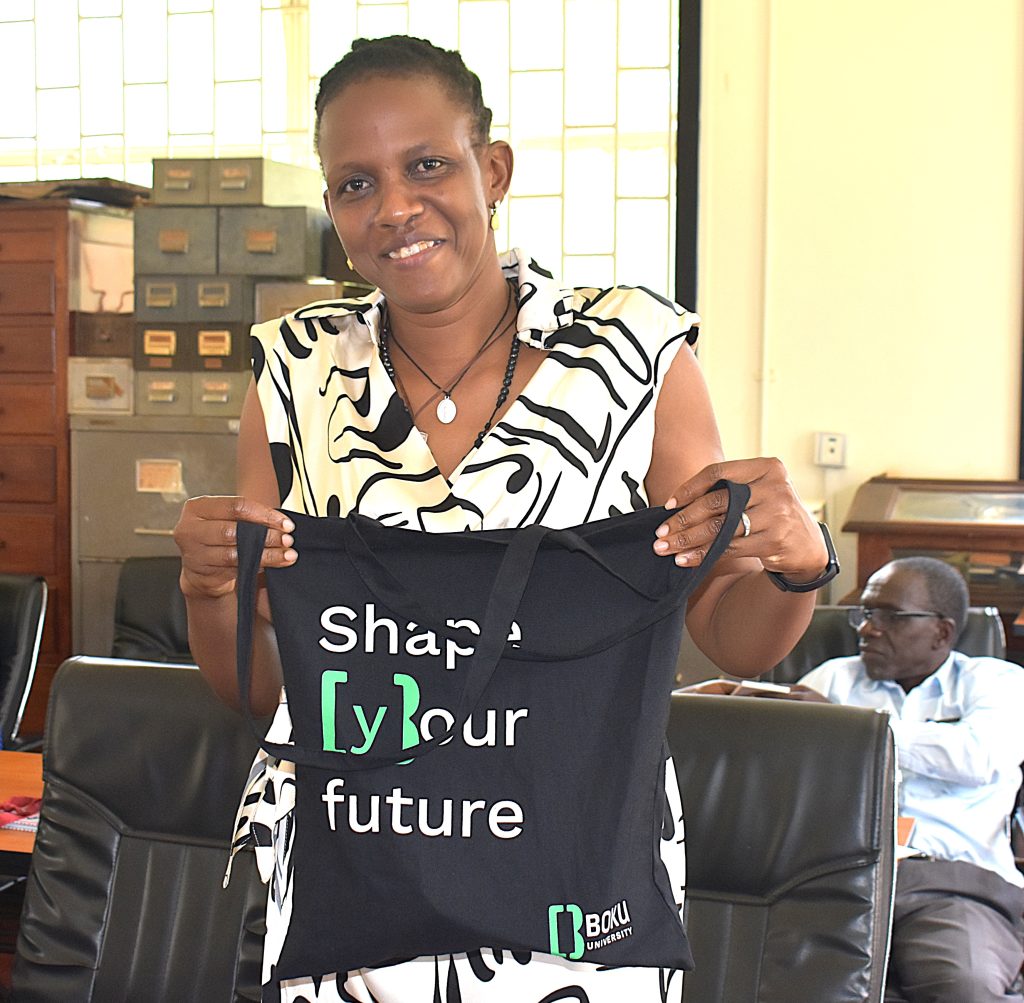
Event pictorial: https://drive.google.com/drive/folders/1HkCCZf_TCPV0V7_ZR2PSVEw1zrEGhZeJ?usp=sharing
Natural Sciences
Simon Mungudit: Mak’s Best Performing Male Science Student & Rising Star in Petroleum Geoscience
Published
3 weeks agoon
February 3, 2026
At just 24 years old, Simon Mungudit from the College of Natural Sciences (CoNAS) has etched his name in the academic history of Makerere University, having emerged as the overall best male student in the Sciences, an achievement earned through perseverance, discipline, and an unrelenting pursuit of excellence.
Mungudit is set to graduate during 76th graduation ceremony scheduled for 24th to 27th February 2026, having attained a CGPA of 4.76 in the Bachelor of Science in Petroleum Geoscience and Production. His academic interests-Reservoir Engineering, Petrophysics, and Drilling-reflect a deep understanding of the subsurface sciences that power modern energy systems.
Early Life and Journey to Academic Excellence
Born to Mr. Owor Thomas, a Game Ranger with the Uganda Wildlife Authority at Murchison Falls National Park, and Ms. Lilly Obewun Grace of Akuru Bridge Village, Nyaravur Sub-County in Nebbi District, Mungudit’s journey to academic excellence began far from the lecture halls of Makerere. At Karuma Primary School, Mungudit scored 12 aggregates in the Primary Leaving Examinations (PLE), setting the pace for his future success. He proceeded to St. Daniel Comboni College, Nebbi, where he attained 14 aggregates in 8 subjects at O’ Level. He then joined Namilyango College, one of the best secondary schools in Uganda, where he studied Physics, Chemistry, and Mathematics (PCM) and scored 19 points, results that secured him government sponsorship to pursue a Bachelor of Science in Petroleum Geoscience and Production at Makerere University.
Gratitude to his mentors and sponsors
Behind these milestones lies a story of humility, gratitude and opportunity. Mungudit credits his parents for supporting his primary and O’ Level education and expresses gratitude to TotalEnergies, which provided a full bursary for his A’ Level studies, covering tuition, upkeep, and medical care. He also acknowledges the Government of Uganda for sponsoring his university education, a factor he says motivated him to excel.
At Makerere, Mungudit thrived in an environment that blended rigorous academics with mentorship. He pays tribute to his lecturers, particularly Dr. Arthur Batte, Head, Department of Geology and Petroleum Studies, for their unwavering commitment to nurturing students and pushing them to excel.
“I always aimed to excel,” Mungudit says. “Together with a few colleagues, we formed a group and held discussions on a daily. This, coupled with a conducive study environment, prayer, and discipline, enabled us to attain excellent grades.”
Dr Arthur Batte describes Mungidit as a humble yet very intelligent student.
Achievements and Professional Experience
Beyond academics, Mungudit consistently demonstrated expertise in petroleum engineering. In 2024, he led a team that won the Reservoir Modelling Challenge, organized by the American Association of Petroleum Geologists (AAPG) Makerere University Chapter, earning prize money and a sponsored field trip to the Tilenga Project courtesy of COSL. He was First Runner-Up in the Petro Bowl competitions of 2023 and 2025, a highly competitive petroleum knowledge quiz organized by the Society of Petroleum Engineers (SPE) Uganda Section. He served as a Student Officer for the SPE Makerere University Chapter in 2023, and in 2024, he chaired the Organizing Committee of the SPE Annual Students’ Technical Conference and Exhibition, helping bridge the gap between academia and industry.
His learning extended beyond the classroom. During his internship, he worked with TotalEnergies, where he applied petrophysics skills to analyze gas-while-drilling data for formation evaluation, hands-on exposure that sharpened his professional competence. At Makerere University, he mastered PetroMod 2018, a critical software tool in oil and gas exploration. After completing his studies in June 2025, Mungudit trained with the Uganda National Oil Company (UNOC), participating in the 2D seismic acquisition in the Kasurubani Block in Buliisa and Hoima districts.
Mungudit currently works as the Special Projects Coordinator for the Society of Petroleum Engineers (SPE) Uganda Section Student Liaison Committee.
Future Plans
Mungudit hopes to work in the oil and gas industry in the upstream sector as a geoscientist. He also plans to pursue further studies in petroleum engineering.
From a village in Nebbi to the forefront of petroleum geoscience, Mungudit’s story is one of an opportunity seized and potential realized. It is a testament to what is possible when talent meets support, and when determination is guided by faith, mentorship, and service. As Uganda’s oil and gas sector continues to evolve, Mungudit stands as a symbol of the skilled, principled professionals poised to shape its future.
The CoNAS fraternity congratulates Mungudit on this noble achievement.
Natural Sciences
Enhancing Data Quality: NutriFishPlus Research Assistants Retooled Ahead of Baseline Survey
Published
1 month agoon
January 20, 2026
The NutriFishPlus Project team successfully conducted a one-day capacity-building training for its research assistants, centered on the Monitoring, Evaluation, and Learning (MEL) framework and the household survey tool. Held on 13th January 2026 at Ridar Hotel Seeta in Mukono District, the training aimed to improve data collection, analysis, and learning processes to support evidence-based project implementation and impact assessment.
It was officially opened by Dr. Jackson Efitre, the Principal Investigator, who introduced the research assistants to the overall goal of the NutriFishPlus Project and the guiding principles of the International Development Research Centre (IDRC) Scaling Approach. In his remarks, Dr Efitre emphasized the importance of high-quality data in tracking progress, informing adaptive management, and scaling impact.
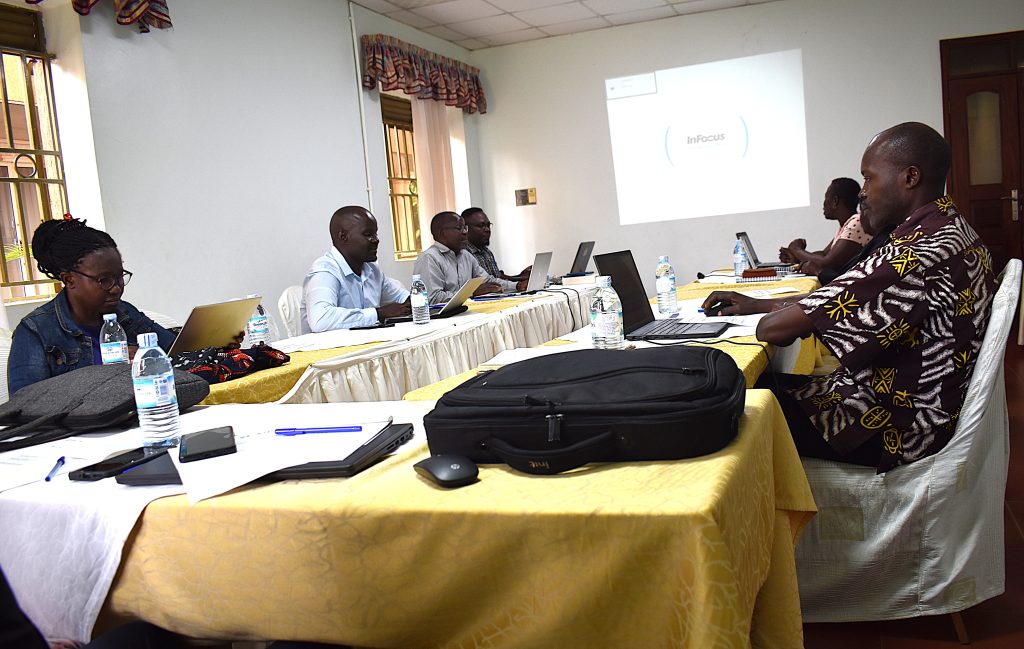
NutriFishPlus builds on the significant achievements of the ground-breaking NutriFish Project (2019–2023), which was funded by IDRC and the Australian Centre for International Agricultural Research (ACIAR) through the Cultivate Africa’s Future Fund Phase II (CultiAF2). Officially launched on 28th October 2025, the two-year and eight-month project seeks to scale proven innovations while deepening nutrition, livelihood, and gender outcomes within small pelagic fisheries.
The project aims to:
- Scale up the adoption of improved and sustainable fish processing technologies, including solar tent driers and raised racks, to reach new fishing communities across Uganda.
- Enhance market access and strengthen supply chain linkages for high-quality fish and fish-based products.
- Empower women and other vulnerable groups while strengthening community resilience through diversified income-generating activities.

Expected Outcomes:
NutriFishPlus is expected to deliver multiple socioeconomic and environmental benefits, including:
- Improved incomes and livelihoods for marginalized fishing communities, particularly women and youth.
- Enhanced health and nutrition outcomes through the development of diversified, market-embedded fish products.
- Establishment of sustainable and replicable fish processing and marketing models across Uganda and the wider East African region.
- Increased participation of women and youth in decision-making and benefit-sharing within the Small Pelagic Fishes (SPFs) value chain.
- Improved socioeconomic conditions and ecosystem health through participatory and scalable approaches.
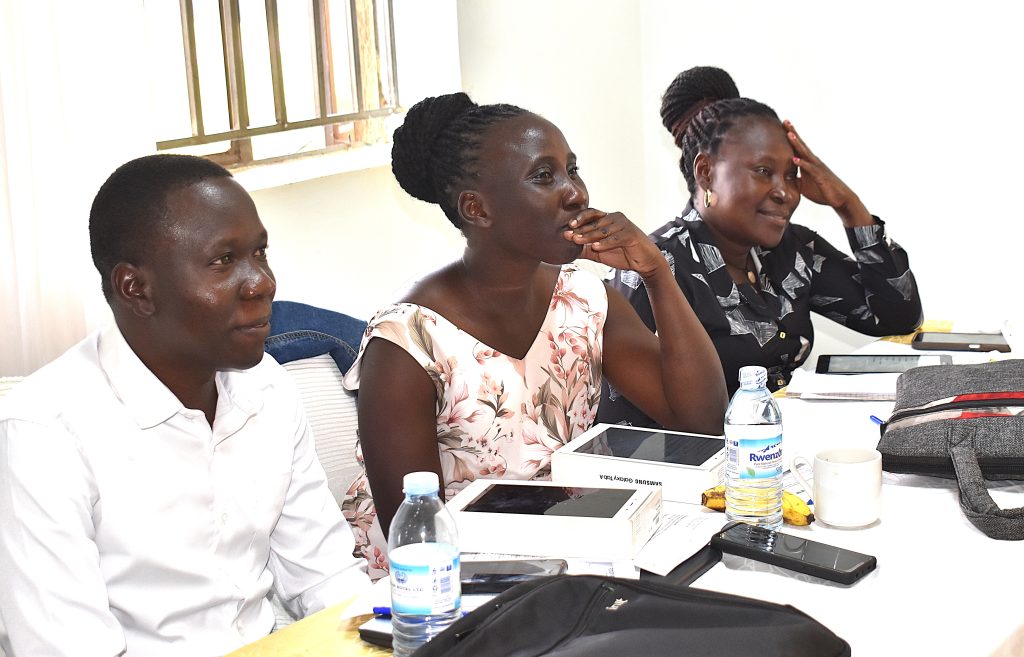
Project Implementation and Partnerships
The project is implemented by the Department of Zoology, Entomology, and Fisheries Sciences at Makerere University, in partnership with Nutreal Ltd and Kati Farms Ltd under a public-private partnership. Project activities will be carried out at five landing sites across Lakes Victoria, Kyoga, and Albert.

The project team comprises:
- Dr. Jackson Efitre (Principal Investigator)
- Dr. Dorothy Nakimbugwe (Co-PI from Nutreal Ltd)
- Ms. Lovin Kobusingye (Co-PI from Kati Farms Ltd)
- Dr. Robinson Odong (Project Officer, Department of Zoology, Entomology and Fisheries Sciences, Makerere University)
- Ms. Juliet Ogubi Nafula (M&E Expert)
- Ms. Nelly Badaru (Gender Specialist)
- Mr. Eugene Swinnerstone Miheso (IT Expert)
- Mr. Maurice Ssebisubi (Kati Farms Ltd)
- Ms. Hasifa Kabejja (Communication Officer)
- Ms. Eve Akongo Ampa (Project Administrator)
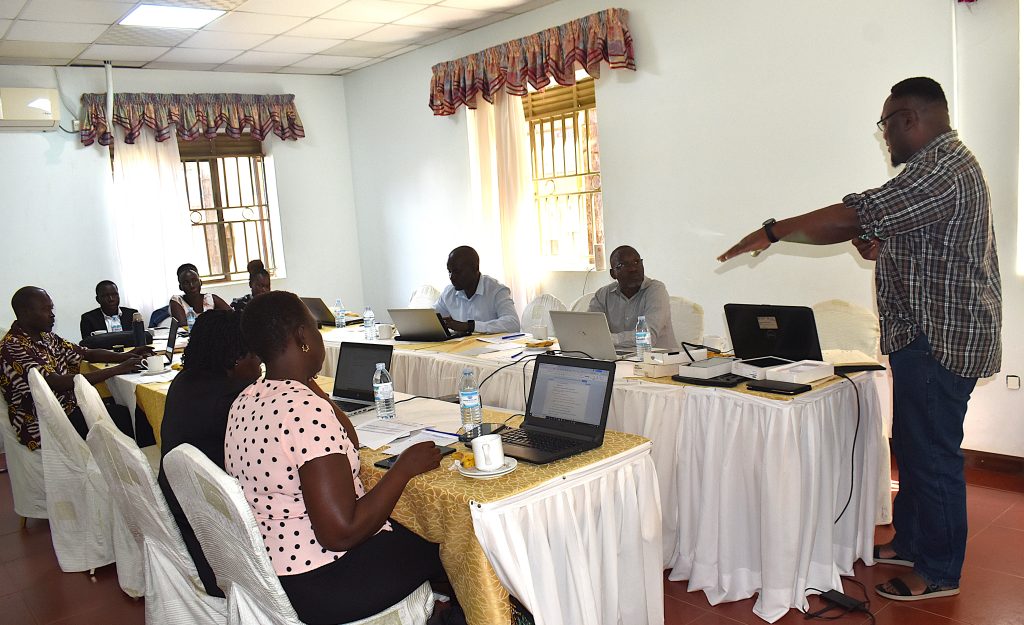
Strengthening MEL and Data Quality
During the training workshop, Ms. Juliet Ogubi Nafula guided the team through the NutriFishPlus MEL framework, highlighting its objectives, indicators, results chain, and reporting requirements. Particular emphasis was placed on the role of high-quality data in facilitating project learning, adaptive management, and accountability to donors and beneficiaries.
A key highlight of the training was a hands-on orientation to the household survey tool, led by Mr. Eugene Swinnerstone Miheso. Participants were taken through the structure of the questionnaire, which covers household demographics, nutrition and dietary diversity, fish consumption, livelihoods, value addition, gender dynamics, and food security. Practical sessions enabled the research assistants to practice administering the tool, apply effective probing techniques, and address common field-level challenges.
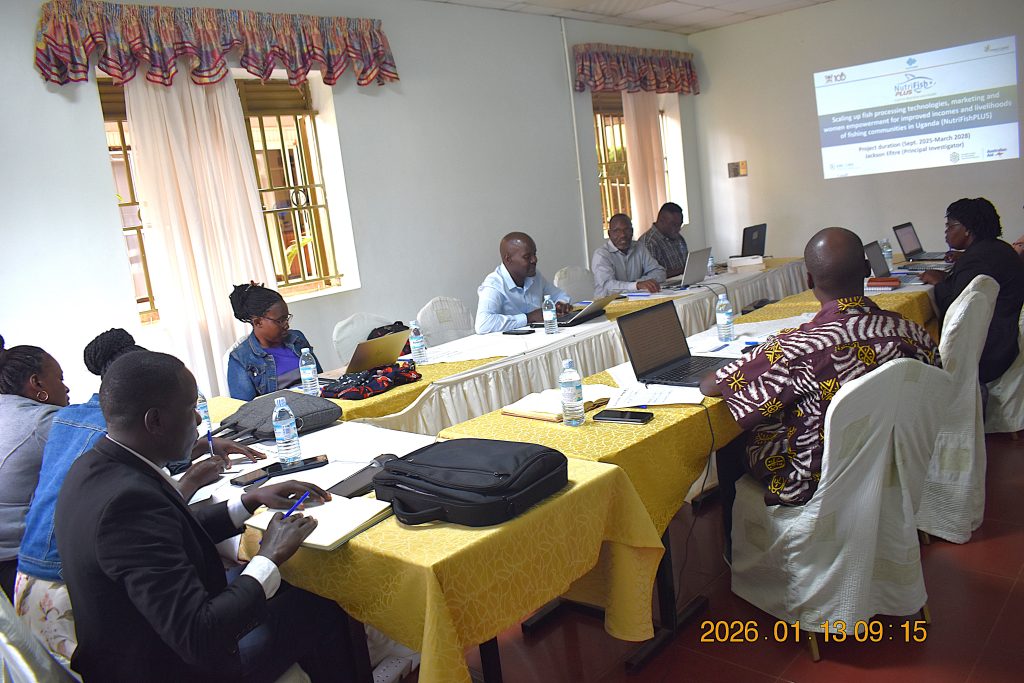
The training underscored critical ethical considerations in household data collection, including informed consent, confidentiality, and respectful engagement with respondents. Data quality assurance measures such as accurate data recording, use of digital data collection platforms, and daily review protocols were discussed to ensure consistency and reliability.
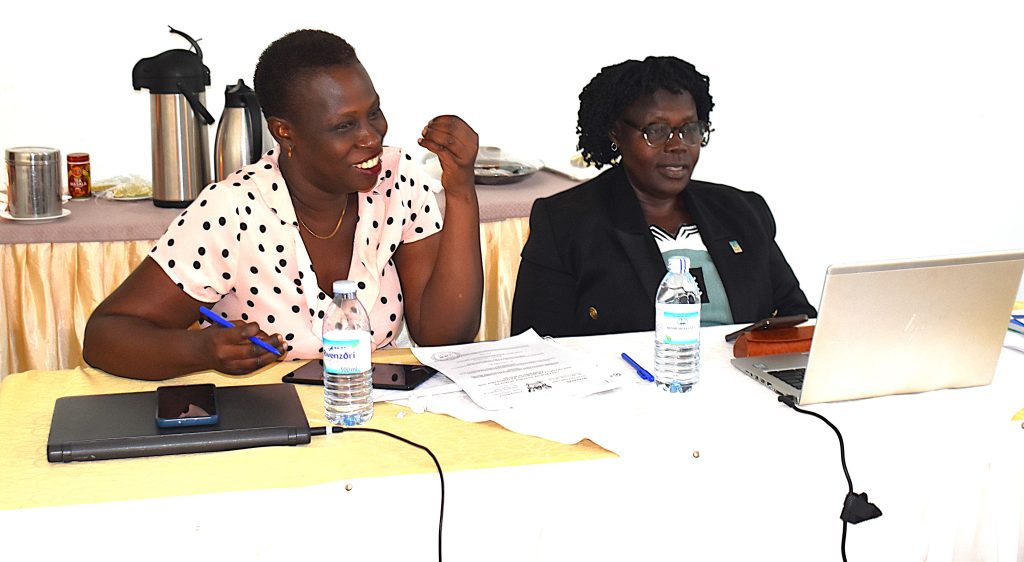
In his closing remarks, Dr. Efitre emphasized that well-trained research assistants are central to generating credible evidence that reflects the lived realities of beneficiary households. “This training is a vital investment in strengthening our MEL system and ensuring that the evidence we generate informs learning, accountability, and improved project outcomes,” he noted.

The participants expressed gratitude for the interactive and practical nature of the training, noting that the sessions significantly enhanced their confidence and readiness for fieldwork. The training concluded with a question-and-answer session and a brief assessment to confirm participants’ understanding of the MEL framework and household survey tool.

Pre-testing of the household survey tool
Following the training, the project team conducted a pre-test of the household survey tool at Kasenyi Landing Site in Entebbe on 19th January 2026, ahead of the baseline survey. The baseline data collection will be carried out across five landing sites: Katosi (Mukono District), Kikondo (Buikwe District), Bangaladesh and Kayago (Amolatar District), and Dei (Pakwach District), spanning Lakes Victoria, Kyoga, and Albert.
Details on the project at: https://news.mak.ac.ug/2025/10/mak-conas-launches-nutrifishplus-project/
Trending
-

 Humanities & Social Sciences2 days ago
Humanities & Social Sciences2 days agoMeet Najjuka Whitney, The Girl Who Missed Law and Found Her Voice
-

 Health6 days ago
Health6 days agoUganda has until 2030 to end Open Defecation as Ntaro’s PhD Examines Kabale’s Progress
-

 Agriculture & Environment5 days ago
Agriculture & Environment5 days agoUganda Martyrs Namugongo Students Turn Organic Waste into Soap in an Innovative School Project on Sustainable Waste Management
-

 General6 days ago
General6 days agoMastercard Foundation Scholars embrace and honour their rich cultural diversity
-

 Health2 weeks ago
Health2 weeks agoCall for Applications: Short Course in Molecular Diagnostics March 2026
